#he has a NARRATIVE SUPERPOWER
Explore tagged Tumblr posts
Text
i’m obsessed with how quintus’ need to make posthomerica so morally edifying accidentally makes him portray the most intriguing odysseus i’ve come across outside of homer
quintus is notoriously uncomfortable with heroes not acting upstanding all the time, or having conflicts with each other, so achilles and ajax and diomedes and neoptolemus and everyone else aren't really allowed to have complicated feelings about anything, and if they disagree with anyone, the Correct and Moral opinion always convinces everyone within a couple lines and then they're all friends again.
but quintus has to collect (mostly) all the events that take place between the iliad and the odyssey in one straightforward narrative, including several shady and self-serving things odysseus does, so quintus' solution is... he writes them but just doesn't comment on them. none of the characters seem to notice whenever odysseus lies or omits part of the truth or follows his own agenda; the text itself lets those moments slide past without acknowledgement. and all the while of course odysseus is also brave, and strong, and passionate and tactically brilliant. he IS undoubtedly a hero.
it makes for such a crazy metanarrative because on the surface odysseus is following the same kindergarten morals everyone else is, but secretly he's playing his own game! it feels like i'm a character in the story because i'm listening to odysseus describe something that happened in an earlier chapter, and i'm the ONLY ONE who goes "wait, that wasn't what happened. ...was it?" it makes me diegetically think "oh okay i need to keep an eye on this guy, he's got everyone else convinced". he's not evil, he's not a villain, he has a ton of positive attributes! but he's the only one in the story who knows how to lie (he even seems to lie TO the story), and that makes odysseus hold so much potential power and danger.
#he has a NARRATIVE SUPERPOWER#and the only two people who seem to notice (too late!) are big ajax and deidamia#sorry i've been in floating around in posthomerica too long now. i'm finding metanarratives#it's a shame quintus only alludes to the palladium heist. you KNOW if he included it he'd have to acknowledge odysseus' shadiness#just NGH i love a morally complicated odysseus you know??#posthomerica#quintus of smyrna#odysseus#tagamemnon
30 notes
·
View notes
Text
maybe im just too mentally ill but the way every character in the bright sessions takes one look at damien and immediately goes This Guy Is Evil Incarnate Scum Of The Earth kindaaaa owwie hurts me
#bro just like. has a personality disorder and a creepy superpower that he uses to get food/shelter and make people hang out with him#just get him some real therapy and teach him cognitive empathy please im begging#i think it especially rubs me the wrong way bc like. okay so the mentally ill guy with no resources or support network has to be exiled bc#he hurts and manipulates people and is according to the narrative incapable of change#but the evil organization the imprisons and experiments on people can be reformed from the inside with the help of one of the people that#ignored the evil shit happening in front of him??#hurtie#the bright sessions#damien gorham#tape recorded
13 notes
·
View notes
Text
for a character to be "of all time" they need to have smth that distinguishes them from the usual archetype they fulfill in an insane as fuck way. they need to leave you reeling with their every life choice. and those choices are always in character which increases the degree of insanity.
#☢️.txt#this is why none of the hannibal characters made it on#bc neither hannibal or will really deviate from their archetypes in a truly unique way#to use akechi as a case study. hes the detective in a gentleman thief novel#making him secretly a hitman isnt all THAT shocking nor is referring to him as the second detective prince#since p4 established the idea of a teen detective having a fan base#even playing up the crowds more than naoto isnt that insane since they actively disliked the attention#however. making him a fucking IDOL INFLUENCER whos constantly on national television and runs a food blog of all things#while moonlighting as a hitman working for his shinzo abe expy father who he plans to destroy#via a poorly thought out scheme he made up at 15 after getting superpowers#while god has also doomed him to the narrative so he can never get his revenge#and his idol-esq personality is obviously fake. except for the fucking /sweater vests/#he faked 90% of his personality as the detective prince. hes incredibly mean and loves violence. but he does sincerely Dress Like That.#oh and hes gay coded to top it all off#no one in hannibal goes that far to challenge their trope#sorry will. becoming a bisexual cannibal isnt enough have you considered becoming twitter famous
4 notes
·
View notes
Text
Let me introduce you to the Superman: Secret Identity miniseries, in which a boy from Kansas in a world like ours is born to Mr and Mrs Kent and they just had to name him Clark.
An adaptation of Sherlock Holmes set in a world in which the fictional character/literary juggernaut Sherlock Holmes, and all the subsequent adaptations thereof, still exist.
Sherlock Holmes (pronounced Holl-mess, as he is constantly reminding people) just had the misfortune of having parents who really liked the books, and his attitude towards his fictional counterpart is pretty much the same as that of Sir Arthur Conan Doyle.
Sherlock runs a Youtube Theory channel called Mysteries Unwrapped with Sherlock Holmes. He has received no less than seven cease and desist letters from the Conan Doyle estate, all of which he has so faded managed to rebuff by pointing out that that's literally his name.
(No he won't change his name. He's Sherlock Holmes the real live human person. Let Sherlock Holmes the non existent fictional character change his name.)
John is Sherlock's flatmate. Sherlock almost refused to live with him once he realised that it would mean staying with a medical student named John, and only gave in once John pointed out that: a) he's a biomedical student, which is completely different from an md, and b) his surname isn't Watson.
It's now been three years, which is long enough for them to have developed a genuine friendship, and for John to have a) started working towards his PhD in biotechnology, and b) for him to start dating somebody with the surname Watson.
Sherlock can feel the narrative closing in.
His Youtube channel is meant to be focused on lost media, fan theories and stuff like that, but he keeps accidentally stumbling upon and then solving genuine crimes.
His brother Mycroft may or may not have chosen that name after he transitions specifically to annoy him.
He doesn't even live in London, but somehow the only flat they could afford was on a street named fucking Baker Street.
Sherlock Holmes and the Unescapable Power of the Narrative.
#he’s a nonfiction writer and essayist not journalist#he marries a woman named Lois and they meet on a blind date their mutual friends think is funny#he also has superpowers like Superman#Superman secret identity#the power of narrative
35K notes
·
View notes
Text
Everybody NEEDS to listen to the new Wild Life retrospective on Imp and Skizz's podcast. They got Grian called in and they give so many cool insights into the series (and honestly say so many things I think people need to hear)
Highlights for me:
Grian designed each wild card to be weaponized and wanted everyone to take advantage of them. He goes over each individually and all the thought he put into them and all the work the backend team put into their execution. He's rightfully really proud of them. Him gushing about Trivia Bot and how excited he was to show his friends the "coolest snail ever" is particularly sweet.
Skizz says discovering each wild card was a LOT of fun. He says something like "I can't believe as an adult I get to have so much fun." Impulse is really impressed with the execution of each, citing stuff like making it rain when the time one activated and the passive mobs spawning in before being replaced, and how the little details like that built excitement and tension.
Grian says how he understands that some viewers maybe just want more seasons of the essentially the same series, ie six seasons of just Third Life, but it's more important to him that the Lifers get to experience something new and fresh. He also doesn't like comparing each series, preferring to consider each one as its own thing.
Impulse can't wait to do another Life series, Skizz is equally excited but tries to hold discussion about it back since he doesn't want anyone pressuring Grian, who is palpably burned out. Like, you can hear how tired this man is. Grian says there will probably be more series since everyone is still enjoying it, but he's not trying to outdo himself and not to expect him to keep escalating.
Skizz always tries to do something new each season yet feels like he always falls back into the same habits and dynamics, but not this time: he feels like he got to explore a new dynamic with the Spanners and had a blast doing it. He and Grian gush about how much fun they had with their "big brother trying to keep his little brothers alive" routine.
They have a grand time making fun of Impulse and his "Sweats". Impulse is unabashedly still hungry to win a series.
Impulse didn't want to kill zombie Skizz, because of the five minute cooldown, but Skizz makes clear that he was really happy with being a zombie, even if there was a lot of doing nothing in between summons. He says it means a lot to him that he got to help with the burden of facilitating the series, even just a little bit.
Grian gives good insight into his personal life strategy: he does some things to deliberately test his relationship with other players. Standing in the Danger Zone was a trust exercise, testing Jimmy and Scar. Jimmy and Scar failed.
Despite Scar failing the trust exercise, Grian heard the disappointment in Scar's voice about the Snail Bot thing and immediately caved, but he's really happy that it led them to in-canon reconciling and becoming strong allies again.
Grian's favorite moment was making Jimmy pay for the failed trust exercise by blowing up the bunker, particularly pleased with his one liner of "it was always gonna be like this". He says Wild Life as a whole has been the most enjoyable series for him, even though he didn't get to have as much fun as the other players due to knowing all the wild cards.
All three of them gush over the scene of everybody failing to kill Joel as he teleports around, laughing about how it was straight out of a movie or an anime. Impulse feels like Joel took his superpower to a new level, but Grian reminds him the he didn't have an army chasing him around trying to kill him. They're all super impressed with how the finale turned out.
Some of the powers were assigned (Cleo, BigB, BDubs, Scar, Lizzie), some were random (Impulse, Martyn). Some were based on players' names, others on their personal narratives, but coming up with ~16 different powers without including any that would just be exploited for cheap instakills was really difficult, which is why there were so many espionage ones. Hilariously, Grian was hoping Scar would accidentally kill Jimmy by punching him off a cliff because of their ritual of trying punching in the earlier episodes. He also gave Scar that power because he knew Scar wouldn't feel bad about killing people with it.
Grian chose to give himself the mimic so he could show people how their powers worked if he needed to, and so that it wasn't given to somebody else who'd have to spend the whole session figuring out the mechanics of 15 separate superpowers and potentially dying because of it. And because he thinks its the coolest one and he wanted it (lol)
All around there's tons of fun details and stuff in this episode of the podcast and absolutely everybody should listen to it all the way through.
#wild life smp#grian#impulsesv#skizzleman#trafficblr#life series#bonus: grian is still disappointed nobody died in the big desert explosion in third life#but skizz remembers it as one of the coolest things ever#its super cool listening to the card breakdowns too#and how intricately grian tailored them for his friends#and the answer to pretty much every <why did you do BLANK differently?> question is#he wanted his friends to have a blast every single episode ;u;#he asked everyone if they had a good time after every session...
2K notes
·
View notes
Text
Okay, so I've read the Spider-man: Across the Spider-verse artbook, and there is this fantastic passage on Earth-42 that gives context to the dimension, Miles G., Uncle Aaron and the Sinister Six.
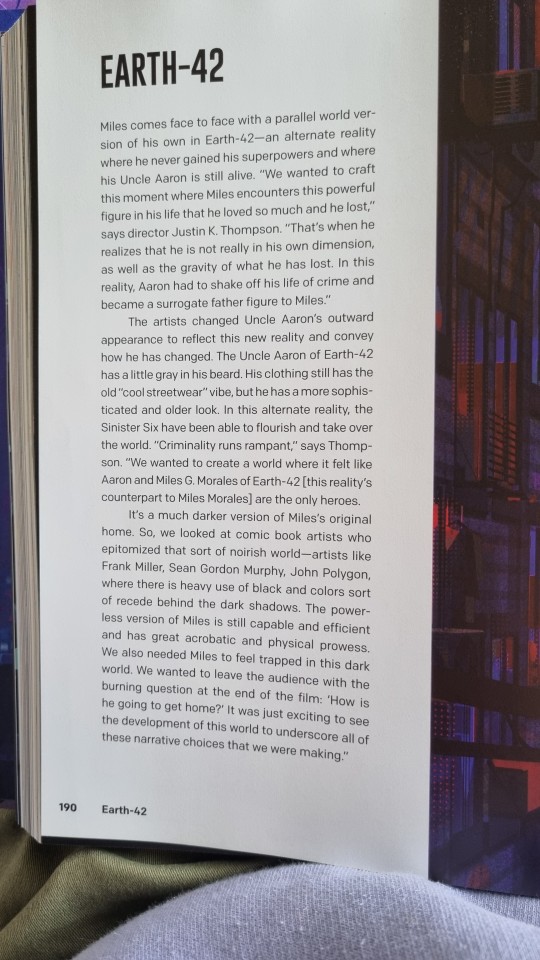
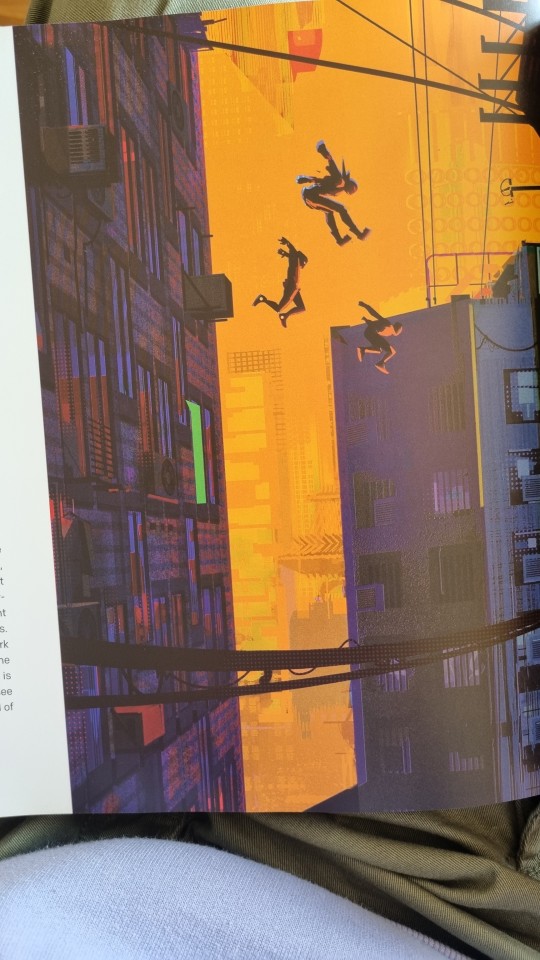
“Miles comes face to face with a parallel world version of his own in Earth-42 – an alternate reality where he never gained superpowers and where his Uncle Aaron is still alive. “We wanted to craft this moment where Miles encounters this powerful figure in his life that he loved so much and he lost," says director Justin K. Thompson. “That's when he realizes that he is not really in his own dimension, as well as the gravity of what he has lost. In this reality, Aaron has had to shake off his life of crime and became a surrogate father figure to Miles.”
The artists changed Uncle Aaron's outward appearance to reflect this new reality and convey how he has changed. The Uncle Aaron of Earth-42 has a little gray in his beard. His clothing still has the old “cool streetwear” vibe, but he has a more sophisticated and older look. In this alternate reality, the Sinister Six have been able to flourish and take over the world. “We wanted to create a world where it felt like Aaron and Miles G. Morales [this reality counterpart to Miles Morales] are the only heroes.”
It's a much darker version of Miles' original home. So, we looked at comic book artists who epitomized that sort of noirish world - artists like Frank Miller, Sean Gordon Murphy, John Polygon, where there is heavy use of black and colors sort of recede behind the dark shadows. The powerless version of Miles is still capable and efficient and has great acrobatic and physical prowess. We also needed Miles to feel trapped in this dark world. We wanted to leave the audience with the burning question: ‘How is he going to get home?’ It was just exciting to see the development of this world to underscore all of these narrative choices we were making.”
#yeah. so the villain allegations against miles g. and uncle aaron has been officially denied#i'm glad they outright denounced it in the artbook now so we wouldn't be umming and awwing for under a year#across the spiderverse#miles morales#spiderman#spiderverse#atsv#spiderman across the spiderverse#prowler#spider-man: across the spider-verse#satsv#miles g morales#aaron davis#earth 42#spider-man#sony#artbook#marvel
14K notes
·
View notes
Text
Hey, I saw the new episode of Wild Life and it was amazing. I love how personal these choices are, even though Grian himself didn't choose who got what power. But seriously, it feels like all the powers were personally picked for each player. I've seen people analyze each ablity and their connections and I wanted throw my hat in the ring. (Okay, update. Watched Grian's video and it's clear that Grian did personalized the powers. He has a list of all the people who have what powers, he just didn't realize how dangerous some of these powers are with red names. He mentioned regretting giving Scar the sit command the first time Scar sat on him so yeah. Unlike the randomness of Soulmates in Double life, these powers aren't random. Just want to clarify that.)
The first one I want to mention is Joel's ability since it's the one that has stumped everyone. I mean, after all, what does triple jumping have to do with Joel? Well, at the beginning of his episode, he mentioned that he hears a slime sound effect when he uses his ability. I think his superpower was chosen because of the slime shop that Joel forgot to create for most of Season 10 of Hermitcraft. Now what do Slimes have to do with triple jumping? Well, slimes are bouncy and create momentum. Also, I think Grian put it in because it sounded like a cool power. Also, Also, it allows Joel to do a lot of PARKOUR! Which Joel is obsessed with.
Rendog got the power of masking himself as other people. This is amazing because he masked as Tango in Secret Life and the guy's an actor. He's always putting up masks like the Red King, the King of Hermitcraft, the Guard Dog of the Fairy Forte, and being part of the Gigaverse.
Gem has Astral projection which was given to her because she hates using freecam so it was a punishment to her for being so too good at the game. However, she was given the ability to give her more control over people since she was able to snoop on everyone. Kind of like a Watcher. (Or Listener in some people's headcannons. I've seen evidence for people to think this is a Watcher power or Listener power. I'm leaning on Watcher Power.)
Cleo was given the power to raise the Dead because she is a Zombie.
BigB is the power of the Creaking which is fitting since he became one of them thanks to living in their forrest.
Bdubs has the power of time because of his obsession with clocks and the power of sleep because the man is obsessed with sleeping in Hermitcraft.
Etho is an loof and sneaky man who likes to keeps his distance. He's also a coward so a quick escape plan by yeeting yourself with wind charges helps. Also, he did Frogger in Minecraft and that's a lot of jumping around.
Tango's ability is to flee like he never fleed before. Aka being a coward and also annoy people. (Someone mentioned the icewalker ability could be reference to Decked out 2. Also flee with extra flee.)
Ldshadowlady (Aka Lizzie) is just focusing on the shadow in her user name. It also represents her time falling in the Void in Secret Life. The void energy engrained in her.
Jimmy got invisiblity because the man is always sneaking around and the fact that Jimmy doesn't get this far normally. Normally he's not even alive at this point. So the narrative is kind of representing his unusual position. Also it feels like a very Listener kind of superpower.
Martyn's power is literally the power to LISTEN to people. Very Listener power.
Impulse's power is to swap places with people. It kind of represents how much of a flip-flopper he was in Third Life. Yeah know, traitor Impulse. Also, Enderpearl satis cambers and using weird glitches to find diamonds in Third life references.
Scott's ability of Animal shapeshifting is not only a cruel twisted torture made up by the Watchers because they hate Scott, seriously, it's the worst superpower, but it also represents Scott's kind and gentle nature. While the guy knows how to fight, most of the time Scott is a nice chill guy. He's friendly and charming like a passive mob. He does his best to support the team and he will sacrifice himself for the team. The guy is also soft with animals. Remember the cow and the pufferfish in Third Life? What about the Axolotos in Last Life? Also, the guy likes to get pets in Empires.
Pearl's ability to fly is the fact that she and Grian are Skyblings but also a more subtle connection to the watchers. After all, Watchers do have angel wings.
Grian's ability to mimic everyone else's powers is so Watcher-coded it's not even funny. It's like he's purposely making it clear to everyone that he's a Watcher now. And the fact that he made this Wild Card to get Skizz and Mumbo back is just icing on the cake. He just never realized how bad his wish to bring his friends back would bite him in the back so hard. Ah Grian, not thinking your plans ahead and thinking about the consequences. Just like always.
And finally Scar. Scar has wanted Super strength all season. He mentioned it in episode one and he's been testing it out every time a Wild Card has been activated except for when his teammates were on red. The guy loves the classic power to punch people and to yeet people off cliffs. It fits his namesake. And the power to sit on everything is just genius. Not only does it allow some very funny moments but it fits Scar's cowboy aesthetic. It's also the perfect fit for Scar because at first you think it's harmless. After all, you just get yeeted a bit and Scar rides on you. All fun and games. But once the fighting begins, this power shows how scary Scar actually is. Now you can't get Scar off you because he's sitting on you and you can't knock him off or hurt him. Sure he can't hurt you back, but it just means he's waiting his time. And the yeeting becomes more scary once your falling to your doom off a cliff. It's also a very protective power since he can make foes fly a million miles away from him, out of sword range and now the only way to hurt him is with a bow. A bow which Scar is way more skilled at using. After all, he is the HotGuy. Also he did mention HotGuy in his episode when he was trying to hit Tango. It's just that he missed it since Tango's so fast. (Oh yeah, I almost forgot, Scar got Thorns as part of his power set. Not only is it another defensive weapon since it makes people not want to hit him because they would be hurt back even with range attacks, but also it represents his connections to the earth. He is a terraformer. It also represents Double life since it kind of mimics the gimmick of if you get hurt, I get hurt of being soulmates. Just wanted to add this in.)
Anyway, I hope you like my analysis.
#life series#hermitcraft#grian#goodtimeswithscar#bdubs#bdouble0#geminitay#joel smallishbeans#martyn inthelittlewood#jimmy solidarity#ldshadowlady#ethoslab#zombiecleo#scott smajor#pearlescentmoon#bigb#impulse#tangotek#hotguy#wild life#wild life smp#gtwscar#watchers#listeners#eyes and ears au
364 notes
·
View notes
Text
[[and then I met you || ch. 27]]
Series: Daredevil || Pairing: Matt Murdock x Fem!Reader || Rating: Explicit
Summary:
A one-night stand years ago gave you a daughter and you are now able to put a name to her father – Matthew Murdock. Everything is about to change again as you navigate trying to integrate your life with that of the handsome and charming blind lawyer’s and Matt realizes he needs to not only protect his new family from Hell's Kitchen, but from the world.
chapter masterlist
Words: 4.4k
ao3 link
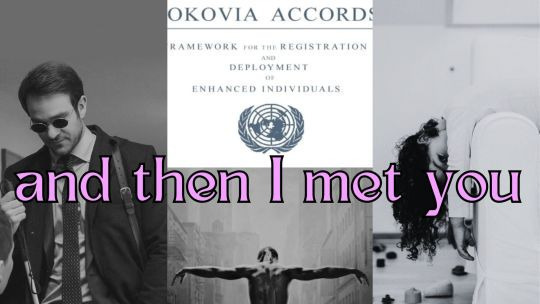
Police Arrest Three After Mass Protests in LA County
By C. Grant
Three people were arrested in Pasadena, California yesterday after a crowd gathered to protest the death of Sheila Pom. Police say the three individuals, whose names have not yet been released, appeared to be Enhanceds attempting to agitate the crowd. Witnesses claim one of the individuals was creating sparks with their fingers and threatening to start a fire, while the two others encouraged the behavior. Police have made no comment about these arrests and all questions about the incident have been redirected to a now defunct phone number.
Sheila Pom was killed in an officer-related shooting two weeks ago after neighbors reported her as a Dangerous Individual under the new Sokovia Accords Act. Pom, 23, worked at her uncle’s auto body shop as a mechanic while also attending online classes to get a degree in Engineering. She was also a telekinetic - someone who can move objects with their mind.
Pom was known to not be shy about her gifts. Pom was seen frequently lifting cars and trucks within garages without the help of equipment and is rumored to have once righted a tipped over semi-truck. Neighbors became concerned when Pom began using her gifts at home.
“We’d come home, and things would be floating up and down the street,” one neighbor said.
Another claimed Pom was unstable, and when she would become upset, things around her would begin to shake.
“I thought it was an earthquake until my TV hit the ceiling,” a source who lived in the same building Pom told GKTV, “I learned the next day her boyfriend broke up with her.”
Officers were called when Pom refused to return a motorcycle to the ground while working on it in a residential neighborhood. After a brief standoff, officers fired two shots, striking Pom in the head, and killing her.
Pom’s family claims she was unaware of the officer’s presence, as wireless earbuds were found near her body after. Pom was known to listen to music to block the noise of machines.
Protests began after the officers involved in the incident were cleared of any wrongdoing.
----
A full-page ad takes over your screen, and instead of continuing to read the depressing article, you close the tab.
There has been a palpable unrest in the news cycle the past week that is starting to leave you with an uneasy feeling in your stomach. You’ve noticed a shift in the general narrative tone and terminology used when discussing people who have superpowers.
Before Sokovia, before Lagos, before Connecticut, the morning shows would bring on people with amazing gifts and gently joke about them joining the Avengers as they made water fly around the set, but now those same hosts debate if they should be allowed to have the right to privacy. ‘Enhanced Peoples’ has been shortened to just Enhanceds and is now spit out like it is something dirty.
You don’t know when the conversation stopped centering around heroes and vigilantes and started being about everyday people, but it scares you that the change happened. There seems to be no official power scale about what is deemed ‘dangerous’ and your mind keeps zipping all over the place trying to justify different lines of thinking.
Does Matt fall under the category of Dangerous?
He is a vigilante, so by default the Accords are directed at him, but is it doubly so? If he was forced to reveal himself to the government, would they require him to wear a tracking device? Or would they try to lock him up?
Could he fight it in court, or would they whisk him away in the middle of the night and you’d never know what happened?
If Matt is deemed Dangerous because of his senses, and not just because he is a vigilante, would Minnie be considered the same?
With how intense and angry everyone is becoming you could see yourself having to take her in to be tested.
To be monitored.
And she is just a baby.
You can’t imagine how others must feel - people who are older, who are just trying to live their lives. The girl who was killed was just trying to fix her bike, like millions of other people do every weekend. She wasn’t going to other countries to fight terrorists. She wasn’t trying to use her powers to rule over others. She wasn’t hurting anyone.
But she was different, so they killed her.
“Mommy! Mommy! Mommy! I need help!”
You’re ripped from your spiraling thoughts and look across the room to where Minnie is sprawled out on the floor. Her Starkpad is in front of her, and she’s set up Pig and Scooby so they are also peering down at the device and you know exactly what she is doing.
It is the same thing she has been doing for a week straight - playing a bootleg Muppet’s math game.
Since meeting Spider-man, all your little Mouse has wanted to do is learn math. She keeps saying she wants to impress him and make him proud, and you are in no way going to discourage her. Every day has been filled with counting and addition and subtraction and you are a bit amazed she has stayed so focused.
You are not going to complain at all about it - you are getting time to yourself while she has been glued to Elmo and Kermit.
You leave your phone on the dining table and head towards your daughter.
“You need help?” you confirm as you crouch beside her. The screen shows a Muppet you don’t recognize, along with various numbers floating around them, and up at the top, the equation that has your little Mouse stumped.
“I need help!” Minnie repeats as she scrambles up off her belly and into sitting. “I don’t have enough fingers!”
She holds up both her hands to show you all ten of her itty-bitty fingers and you make a sympathetic noise.
Mouse has been getting pretty good at using her fingers to help her with addition and subtraction, but on only one hand. She uses the index finger on her right hand to help count by pointing at each finger and hasn’t quite worked out she can use her fingers to point and count. That is okay, though, as you are happy to lend yours to her important cause.
“Okay, how many fingers do you need?”
You hold out your hands and she instantly begins to manipulate them.
“This one…this one needs three! One, two, three!” She pushes your thumb and index finger down so the other three remain up, then she pushes down the pinky of the other hand. “And this one is four!”
“So, three and four? What are we doing with three and four?” You ask, trying to not laugh at her determined face.
“We adds them!” She chirps, before starting to jab at your fingers, “One, two, three, four, five, six, seven! That’s seven fingers! Mommy, it’s seven! Three plus four is seven!”
“That’s right, it is seven. Which number is seven?” You direct her back to her game, where she triumphantly picks the correct symbol. The Muppet congratulates her before presenting a new equation.
Minnie squeals in delight before ripping the device off the ground and shoving it in your face, “I know this one! Mommy! I know this one! It’s three! Mommy! It’s three!”
You can’t even process what the question is before the screen is out of sight. Your daughter holds her Starkpad above her head, treating it like some war prize as she starts spinning and dancing around the living room.
“It’s three! It’s three! It’s three!”
You laugh at her antics, heartwarming at her pureness. How could anyone ever think she’s a danger?
“Are you sure it’s three?” You tease as you watch her.
She whips around to you, eyes scrunching up into a glare, and barks, “It’s three!”
“Okay, okay, it’s three.”
You push yourself up into standing just as Mouse returns to her spot. She drops her Starkpad to the ground a little harder than you would prefer, but that is why it has a big bulky case. She plops down in front of it and happily smacks the number three that is floating around the screen.
You let yourself watch her for a few seconds, silently bombarding her with all the love you feel for her. You want to wrap her up and live in this bubble forever.
Except, there is one element missing from your perfect moment. You wish there were a pair of arms wrapped around your waist and a chin on your shoulder. You want to lean back against a muscular chest and lose yourself to eternity like that.
Instead of indulging those thoughts, you tell yourself to stop fantasizing and you make your way back to the kitchen to check on dinner.
Vegetable curry has been simmering on the stove for most of the day. It has been a while since you had the energy to make the dish from scratch, but you had a craving this morning and went all out. You’ve made curry for Minnie before, and she did not complain - though you think that is because her portion was mostly rice and hot dog cuts. You plan to do the same again tonight, and if she wants more sauce, you’ll give it to her.
You check your seasonings and give everything a stir to make sure nothing gets stuck at the bottom of the pot. The rich aroma tickles your nose, and you are glad you don’t have to wait much longer to treat yourself.
As you debate adding a pinch more salt, you catch Minnie sneaking towards you out of the corner of your eye. Her movements are slow and dramatic, and you pretend you don’t notice her. This ruse works, and you appropriately jump in fear when she suddenly tugs on your shirt.
“Up!” She demands and you oblige, scooping your daughter onto your hip. As soon as she is high enough, she cups her hands around your ear and leans into whisper, “Daddy saids the food smells yummy-yummy.”
She quickly dissolves into giggles, and it is infectious, so you end up smiling.
Matt hasn’t been over for dinner in a hot minute, and you are hoping to have a nice quiet family night, before he goes out on his Patrol. The plan is to watch a movie after your meal and Minnie has already prepared for this by dragging multiple blankets out to the couch. You just know she is going to demand a cuddle pile, and now that you and Matt are intimate, it isn’t something you are nervous about.
You just want to have a good time.
“Can you tell Daddy everything is almost ready?” you ask, even though you know Matt can probably hear you just fine.
Mouse, always eager to be helpful, nods and relays the message directly into your ear. You try to not grimace, and so it won’t happen again, set her down on the ground.
“Can you plug in your Starkpad so it can sleep for the night?”
She streaks off to do her newly assigned task, leaving you to start setting the table. When you were at the store, you bought Matt a bottle of beer - a brand you know he likes - and you set it at his designated spot. You’ve grown accustomed to just drinking water and juice, but you don’t want to push that on to him - not when he’s a guest and coming over after a long day of work.
As you start to make everyone’s plates, you hear the water in the bathroom turn on. You know Minnie knows the routine for getting ready for dinner and you just hope she isn’t trying to wash Scooby’s paws again. You are worried he’ll end up moldy and you aren’t sure what you will do if that happens. You peek into the living room and are relieved to see your daughter’s best friends have been relocated to sitting on the coffee table, facing the television.
You finish setting everything up just in time, it seems. Minnie runs from the hallway right to the door as you go to wash your own hands, and you rush to get all the soap off so you can help her open the door.
Matt is standing on the other side, looking handsome as ever in a gray suit. He looks like he’s had a busy day - his hair is windswept, and he is sporting a strong five o’clock shadow. There is a garment bag draped over his arm and his saddle bag looks a little bulkier than usual and you wonder if he ran some errands on his lunch - picking up his dry cleaning and such.
You barely have time to take in his appearance before Mouse is launching herself at him.
“Daddy!” She shrieks and Matt oh so easily swings her up onto his hip. “Daddy! We’re having vege-tuhble kermies for dinner! I helped make it! I cut up ALL the carrots! By myself!”
“By yourself, huh?” Matt confirms, a bright, warm smile taking up his entire face. “Soon you’ll be making us dinner.”
You step aside so he can come in and help to take his things to hang while Mouse soaks up his attention.
“No! Mommy makes dinner because…’cause she makes the bestest foods. I just help!”
“You are a very good helper,” you interject, “You keep a very clean workstation. A professional chef would be proud.”
Minnie beams at the praise, then a microsecond later, is wiggling in to be let down. Her feet hit the ground and she takes off running back toward the living room, probably to collect something to show off to her Daddy.
Matt takes the small break to turn his attention to you. A hand goes to your cheek, and instead of a brief ‘hello’ peck, he kisses you like he wants to turn and pin you to the wall. It catches you off guard, but you easily melt into it. You clutch at the lapel of his suit jacket and try to not moan as he nips at your lips. You open your mouth for him, but being the tease he is, he pulls back just enough to whisper against you.
“Been thinking about that all day.”
The words send your blood rushing - some north to your cheeks and the rest to your cunt.
He’d been thinking about you? About wanting to kiss you? Or has he been thinking about more than that - because you must admit, you’ve been thinking about it. You’ve had more than a few thoughts about what you want to do to him the next time you two are alone together and those thoughts were certainly very explicit.
“Matt…” you totally do not whine out but instead of replying, his grin just turns cocky. He pulls away as Minnie returns to the entryway, and you decide you need a drink of your water. You escape and Mouse starts showing off her latest masterpieces to Matt.
Food coloring, cotton balls, and popsicle sticks have proven to be a massive hit and Minnie has made a whole collection of things for Matt - there’s butterflies and flowers, a house with clouds, and various abstract pieces. You are sure his office is already filled to the brim with his daughter’s art, and you would not be surprised if he started to hang things from the ceiling when he does run out of room. He seems to treasure every little thing Minnie has given him and it warms your heart so much. You hope that love never runs out.
Somehow, Matt ushers Minnie back to the dining room while she shoves different papers into his hands and gets her up in her booster seat.
“I’m going to put all these in my bag, so they don’t get dirty or lost, okay?” He tells Minnie, who nods way too enthusiastically.
“Keep them clean!” And then, just like that, she switches from being excited her Daddy is there to being a hungry toddler. She whips around to face you and asks in an almost impatient manner, “Can I has my hot dogs now?”
You give her the go ahead as Matt returns to the table and takes his place. You quickly tell him the placement of everything, including his beer, then quickly add, “If you don’t like it, I have a few different things I could make you. Or we could order something.”
A brief panic runs through you when Matt scoffs. You think you’ve insulted him - having him come all the way to Chelsea to eat a dinner he won’t enjoy and having to find a substitute.
“I love curry and this smells delicious. I wouldn’t trade it for the world - in fact, I’m hoping some of those leftovers on the stove are for me to take home and lord over Fog tomorrow.”
You flush at his sweetness and mumble out you’ll pack him some to go. This seems to please him, and he starts to dig in. Ever the little parrot, Minnie mimics him by shoveling food into her mouth with a big grin and you can’t help but laugh a little.
“It’s nummy!” Your little one declares, and even if she’s just eating plain rice right now, you’ll take it as a win. You know well she won’t eat what she doesn’t like.
“Speaking of yummy,” Matt starts, slow and deliberate, with his head angled towards you, “I was hoping we could go somewhere yummy together.”
You blink slowly at the statement, rolling it over in your mind and trying to dissect the meaning. Did he want to go somewhere for dessert? Maybe get ice cream or something? “Somewhere yummy…?”
“Mhm,” he hums, then his smile becomes a bit more sly. Even though you know it isn’t true, you feel like, behind his glasses, he is hungrily looking you up and down, “Somewhere like Uvas.”
The name doesn’t automatically generate anything for you, but after a moment, it dawns on you. Uvas in a Spanish restaurant near Central Park known to be high end and impossible to get into. It’s been in the local tabloids a few times for turning away minor celebrities who don’t meet the dress code. You’re mouth parts slightly in shock.
“What’s Oo-vuhas?” Minnie asks around her fork, her big eyes looking between you and Matt. “Do theys has yummy foods?”
“Oh, they have yummy food,” Matt teases. He then leans forward a bit in his seat and stage whispers to her, “It’s where I want to take Mommy for a date.”
“A date?” Minnie scrunches up her face at the word while your mind is still spinning.
Matt wants to take you on a date? To Uvas? You have never been anywhere that fancy or expensive as a date. Hell, you’ve never been somewhere that fancy, period. The nicest date you’ve ever been on was Hard Rock Cafe - which says a lot about your dating life.
“A date,” Matt confirms, smug and knowingly scheming. You can hear it in his voice as he tells Minnie, “That is where Mommy and Daddy go and have dinner together as grown-ups.”
Up goes Minnie’s hand into her mouth, but it stays there only a split second. Her eyes get impossibly bigger and filled with wonder, and she whispers, “Like Lady and Tramp?”
“Exactly like Lady and Tramp.”
“Mommy!” Minnie says a little too loudly, pointing her fork at you. “You gotta go to Oo-vuhas and be Lady and Tramp! You gotta!”
And at that moment you know you can’t say no, and that Matt knows that. You can’t tell your daughter you don’t want to be like Lady and Tramp. Not that you don’t want to go on a date with Matt - the idea gets you giddy and makes your stomach flutter - but you thought if it happened, it would be a coffee or something. Not somewhere where you can’t even afford to look at the building. The idea makes you a little nauseous, because you are sure you’d make an absolute fool of yourself.
But Matt looks determined and sure of himself. You are certain he asked in front of Minnie so that she could help bully you into saying yes to such a lavish date.
Luckily, your mind is working in overdrive, and you choke out, “I don’t have anything to wear. They have a dress code, don’t they?”
You don’t expect Matt to push his chair out and get up. Your throat instantly tightens up and fear shoots up your spine. Have you offended him? He clearly wants to do something with you and you’re over here hesitating. You must be coming off as a complete bitch.
You start to stand up yourself as Matt disappears into the entryway. You don’t think he’d just leave without saying goodbye to Minnie.
Maybe you can talk to him - explain that somewhere a little less grand would be ideal to start.
Before you can start to follow him, Matt is coming back to the table, holding up the garment bag he brought with him, still looking like the cat that got the canary.
“I thought you might say that,” he starts, his voice almost a little musical, “so I got you this.”
You stare dumbly at him, shock and confusion overtaking your system.
He got you something to wear? To Uvas?
No one has ever bought you clothes before - except your parents. Even when you were pregnant, the small amount of gifts you got were all for Minnie.
You distantly hear Minnie start saying something about presents, but it is all muffled under the sound of blood pumping through your ears. You step forward hesitantly and reach out for the zipper of the bag, your hand shaking slightly.
You expect it to be a joke. You’re going to open the bag and there’s going to be a clown costume inside, or a skimpy dress people like arm candy to wear, or something akin to a Burka.
You don’t expect a black floor length sheath gown. The silhouette is simple, but you can tell just by looking at it the quality of the dress is top notch. The fabric has a nice weight to it, and it is incredibly soft to the touch that you have the distinct feeling that it did not come from a dress warehouse or a department store.
This type of dress would come from a boutique uptown and would cost a few hundred dollars.
You are so caught up in admiring the dress, you don’t notice Minnie come up beside you until she is also touching the dress. Panic that she might have crumbs or curry on her fingers runs through you, but you force it down.
“It’s like a princess dress for Mommy!” Mouse cooes and you feel your face start to heat up.
You’ve never worn something so nice before and certainly nothing that would be fit for a princess, but it seems like Matt and Minnie are on the same page.
“Well, I want Mommy to feel like a princess.”
You want to hide your face, but you know you can’t, so you cover your mouth instead.
“Matt, this is beautiful. But this is so much, I can’t accept this.”
You know that while Matt is a lawyer, he’s still struggling a bit financially. If he had his way, you know he wouldn’t charge anyone for his services, and even though Nelson, Murdock, and Page has paying customers, they still have to stagger out their bills.
He shouldn’t be spending his hard saved money on you.
Matt sighs your name before gently draping the garment bag over the back of his dining chair and stepping towards you. Both his hands go to your waist, and you freeze up as he steps close enough to press his forehead to yours. Your heart begins to wildly beat when his hands slowly begin to rub your sides.
“Let me spoil you. To make up for all the dates I’ve missed. Please?” His lips dip into a small frown and you feel like you’ve kicked a puppy.
He’s gone out of his way for you, and you are being so ungrateful.
But it is so hard to say yes. Guilt is pooling in your stomach, and you just want to disappear into the shadows and be forgotten about. That is so much easier than Matt holding you, saying such sweet things.
You don’t want to ruin everything.
You close your eyes as you have a war inside yourself. All you have to say is ‘Yes’ and you’ll make Matt happy, but the monster inside of you keeps dragging your mind into a pit.
Matt wants to treat you like a princess, but how crushing will it be when he decides that is no longer the case? Can you take that?
The corners of your eyes start to sting and your monster starts to mock you for getting worked up over something as simple as being asked on a date.
Why can’t you be normal?
Why can’t you accept this?
Why can’t -
The thoughts cease as Matt’s lips press against yours, soft and sweet and tempting. You respond hesitantly.
“Let me take care of you,” he breathes into your mouth, making you shudder. “You deserve it.”
“You deserve it!” Minnie chirps from beside your knees and you very suddenly remember where you are and what you were doing. You try to pull away from Matt, thinking Minnie hasn’t seen the two of you like this yet, and it might confuse her, but he keeps his hands firmly planted on your hips, not letting you go. You don’t try to fight it, instead, you turn your head away, trying to hide away in your shell.
You know there is no way you will win this. Matt is determined and he clearly has Minnie on his side, so, very hesitantly, and feeling like you are going to throw up at any moment, you nod into Matt’s shoulder.
“Okay.”
Mouse lets out a deafening cheer and you feel her dart away.
“LADY AND TRAMP! LADY AND TRAMP! LADY AND TRAMP!”
Matt laughs at her excitement over something she doesn’t understand, while you tuck yourself into his hold, wondering how long you have before he ends up shattering your heart into pieces.
---
tags:
@two-unbeatable-beaters @kiwwia-wiwwia @1988-fiend @xblueriddlex @loves0phelia @ninacotte @lovelyygirl8 @littlenosoul @ednaaa-04 @astridstark13
@lovingkryptonitehideout @moongirlgodness @soocore @bluestuesday
@starry-night-20 @rebeccapineapple @writtenbyred @cherrypie5 @capswife @silvercharacterchaos @resting-confused-face
@Specialagentjackbauer @yarrystyleeza @ofmusesandsecrets
@midnightreids @cloudroomblog @yeonalie @thychuvaluswife
@petrovafire39 @ghostindeath @roxytheimmortal
@allllium @waywardcrow @thatkindofgurl @waywardxrhea
@anehkael @akilatwt @lostinthefantasies @reluctanthalfwayoptimism @ethereal-blaze
@nennia-2000 @seasonofthenerd @abucketofweird @mattmurdockstateofmind @imagineswritersblog @hazelhavoc @smile-child-13 @allst4rsfall @hashcakes @kezibear @mapleaye @sammanna @gamingfeline @moon-glades @nightwitherspring @phoenix666stuff @dare-devil
@ladyoflynx @hobiebrowns-wife @sarcasm-n-insomnia @lillycore
@dorothleah @mattmurdocksstarlight @mars-on-vinyl @mywellspringoflife @sleepdeprived-barelyalive @simmilarly @soupyspence @darkened-writer @akila-twt
@murc0ckmurc0ck @groovycass @sumo-b98 @just3rowsing @tongueofcat @zoom1374
@theclassicvinyldragon @aoi-targaryen @lunaticgurly @nikitawolfxo @shireentapestry @snakevyro @yondiii @echos-muses @honeybug-victoria @the-bisaster @ristare
@mrs-bellingham @eugene-emt-roe @cometenthusiast @stevenknightmarc @yes-im-your-mom @hunnybelha @actorinfluence @capbrie @prowlingforfood @jupitervenusearthmars
@mayp11-blog @danzer8705 @thinking-at-dusk @remuslupinwifee @akila-twt @nommingonfood @mattmurdocks6thscaleapartment @dil3mma @allllium
329 notes
·
View notes
Text
ENDOO SHUT THE FUCK UPP

SO U MEAN TO TELL ME
THAT OUR FAN THEORIES
ARE CORRECT.
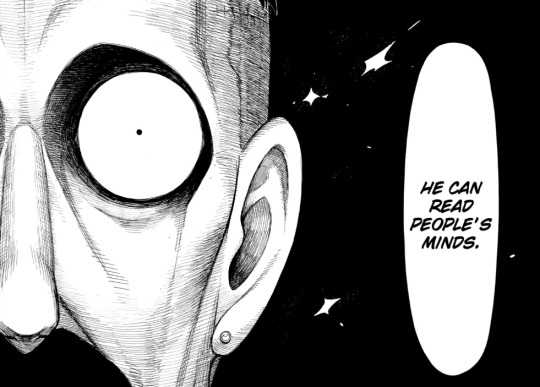

(endo-san, if you've planned this from the beginning, then a thousand applauds for you for sticking to this plot & foreshadowings for so long. If u were just throwing shit up & rely on fans' theories to see where you're going next, then great job for making it seem so seamless. wtf.)
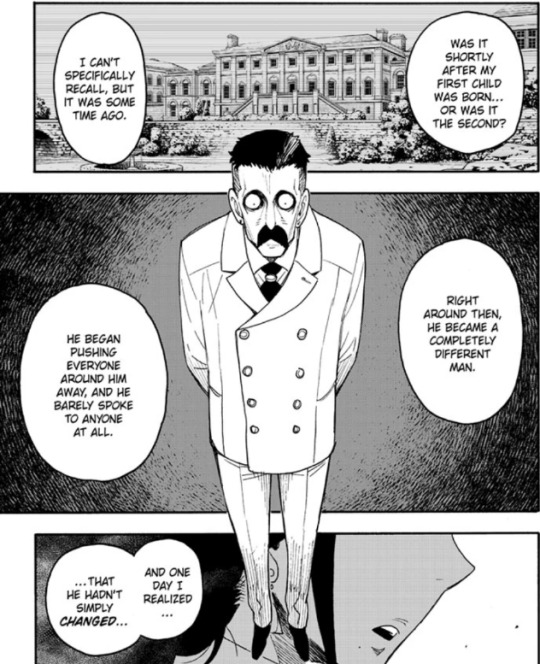
I still don't buy the "Donovan is an alien" narrative completely; I still think he changed after he secretly volunteered to be a lobotomy experiment subject, to get the superpower he wants to reach a greater understanding in humanity.
Although, if Endo really wish to introduce a terrestial being into this series, then, does that mean Anya's telepathic ability is really born from the lab's experiment? Is she born from the sperm of an alien?? Alien DNA recombination?? Lolol. *edit: this is just me hoping that Anya's telepathic ability was developed in vitro, bc the idea of those mad scientists opening up Anya's skull & cutting up her brain whe she was a baby is just sick beyond belief & i cant accept that.*
I am so so glad to see Fiona in this chapter, trying to extract extra info from Desmond's staff! It really hammers down how incredible this valuable opportunity is for Westalis. Great job Endo-san, for not forgetting to include this 👍
Wait.
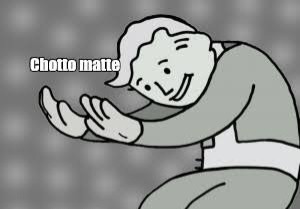
Wait a damn minute.
If what Melinda say is true, Donovan can read minds,
Then Donovan must've read Twillight's mind on their first meeting; his fake persona & and Operation Strix have already been busted.
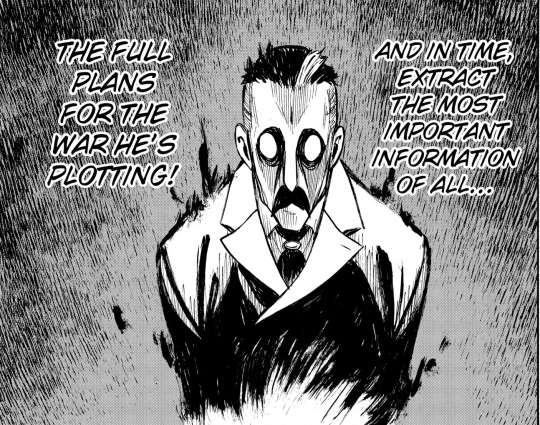
Maybe this is not just a mere illustration inside Twillight's head, maybe this really IS Donovan's reaction when he find out about Operation Strix?? LMAO
Or maybe Donovan can only read minds to a certain extent –not fully like Anya, so maybe he can only get the gist of what people are thinking; so he doesn't know Operation Strix yet, but he knows that Twilight wants to extract some information from him.
(though I wanna add, even if Twillight is from the opposing country, I hope Twillight's sincerity to meet in the middle could reach Donovan too.)
I've known these theories for awhile, but could these be true afterall?? (We're already at this stage, but I still don't wanna assume fanons as canons.)
Then.
IF Damian —at the family dinner— was remembering Anya's confession that she can read minds, and he wished he could read what's on his father's mind too,
Does it mean Anya's telepathic ability is already busted by Donovan?
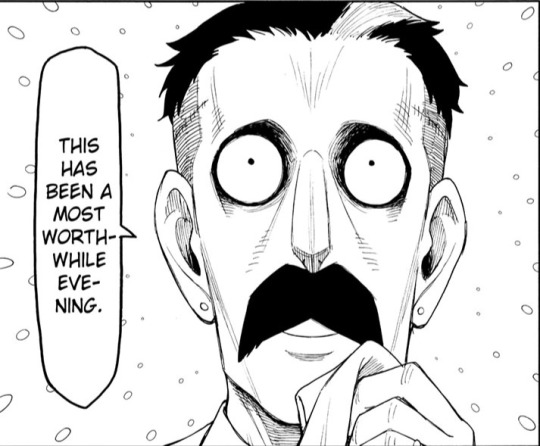
Is my theory from ch 106 correct afterall???
Oh wAIT.
FUCK I forgot if Donovan read Melinda's mind too, then he must've learned that Melinda has befriended Yor Forger. The mother of Anya Forger. The daughter of Loid Forger.
Combine that information from Melinda and information from Damian that Anya can read minds....
... does it mean Donovan has assumed that Twillight from Westalis is using his telepathic "daughter" as a spy in Eden Academy?
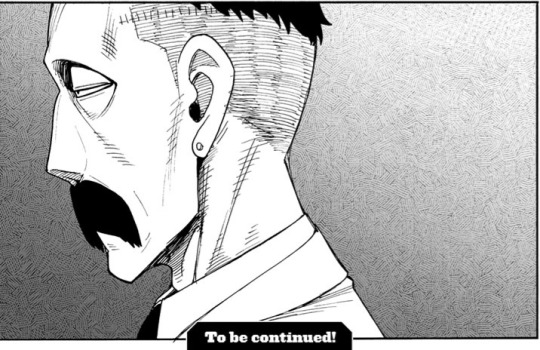
Funny thing is, Twilight himself has no idea about all this implication. He's a million steps away from Donovan.
HAHAHAHHAA

(lol how could I not read this from miles away)
Argh fuck, I'm really worried for Anya now.
This could very well escalate into the "war" of obtaining Anya as an asset. Maybe it'll still be light-hearted, like manipulating Damian's romantic feelings for Anya by inviting her to have dinner together, but still. At first, I thought Donovan might get Anya expelled from school because she's dangerous, but I figure she's just too valuable to be tossed away; it's better to keep her close while extracting info from her as much as he can. Or use her ability to the fullest.
At least Anya is now aware that Donovan has the same ability as her, so at least she can proceed with more caution now.
I hate seeing Anya being the only one aware of the whole situation & she struggles alone to keep it all together — like what she has done all this time. That's why I really want Anya to come clean with Twilight so he can at least get a picture of the whole situation he's facing right now, and protect her properly, but I know it'll massively shift the Forger dynamic we're used to. I have no idea how will Endo handle this development from now on.
Well, that's enough anxiety for tonight.
Stay safe Anya! 🙏🥺🥺🥺
#spy x family#spy x family manga#sxf#spy x family spoilers#sxf spoilers#sxf manga#spy x family chapter 110#sxf ch 110#sxf manga spoilers#sxf theory
151 notes
·
View notes
Note
🔥worm
I understand and agree with the common criticisms of Skidmark's portrayal vis a vis the ugly portrayal of black people and drug users, but nonetheless I'm fond of the character on a number of levels. He's significantly smarter and more competent than he's given credit for within the narrative or within the fandom at large- from the logic underpinning the demeaning naming conventions of his crew, to the fact that he's one of the only on-screen characters to successfully engineer a trigger event, to the untold story behind how he acquired his Cauldron vials and his knowledge of their potential pitfalls. He holds his own against Faultline in a fun way. He gets some really funny lines. His power- and it's use for the trigger arena in arc 11- is the crab-bucket mentality made literal. Thematically I rarely see anyone point out the ways in which he fits into the observed schema of how all of Taylor's enemies are foils to her in some way- he's the only one of her antagonists who's also trying to tap into the power of the masses, a dark mirror to her strongwoman cult-of-personality tactics at a point in the story where the one-bad-day logic governing superpowers and supervillainy has been applied to the entire population of the city. Obviously, the entire package is fatally dragged down in the previously litigated ways by the 1980s-PSA-level of narrative hostility towards drug users and dealers, his status as the butt of every joke, and the ultimate fate of his entire team being unceremoniously exterminated in a sequence that borders on slapstick so that Slaughterhouse Nine can receive a slight credibility bump before they start taking dive after dive. But there's nonetheless some there there. There should have been a merchants interlude
#thoughts#meta#worm#wormblr#parahumans#Bottom line I think he's textually smarter than authorial commentary would suggest#ask#asks#ask game#effortpost
169 notes
·
View notes
Note
Following Topaz's explanation that Cornerstones are made to fill the hole in the user's heart, what "hole" in Aven's heart do you think his drag queen powers are meant to fill? Especially since Topaz remarks he's the only one with such showy powers
Still trying to catch up with all the messages in the inbox; sorry to everyone for taking a million years to respond.
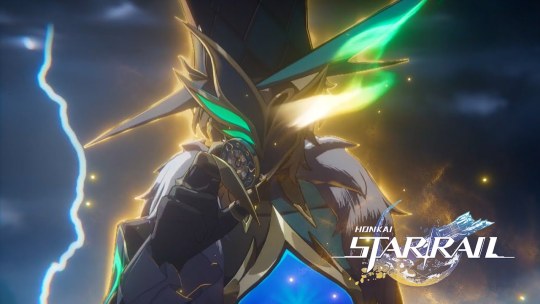
So cunty, and for what???
Anyway, first, when Jade talks about the Stonehearts' "voids," the alternate reading above that word is actually "ambition." And she mentions that the reason she risked reaching out to Firefly is that she views herself as similar to Firefly--Jade is someone with an unfulfilled wish.

I think there's enough here to suggest that the Stonehearts' voids are not quite what we would normally think of when hearing the word "void"--rather than being best understood as something removed or something lost, their voids seem to be "something desired." An unfulfilled goal. An unmet need. A burning ambition. A secret wish. They all have somewhere they want to get to, and they've signed on-board with Diamond's Preservation project because his power is the fastest way--maybe the only way--to get there.

The implication here, by the way, is that the Stonehearts are acting out the very act of Preservation itself with Diamond. The goal of Qlipoth is for the universe to be saved, an unshakeable resolution to stop Destruction's wanton obliteration. Thus, Preservation itself can be understood as "A desire that must be continuously protected and relentlessly pursued." To live. To endure.

In using the power of an emanator to protect and provide the Stonehearts with ways to pursue their own desires, we replicate in miniature the exact resolve and endless pursuit of perseverance that Qlipoth is acting out in the broader universe. The will of Preservation empowers the Stonehearts--and in turn, the Stonehearts swear an oath to aid in Preservation's mission. It's a mutually beneficial arrangement, and it also simultaneously imitates Jade's shop perfectly: I'll give you exactly what you want, if you give me what I need.

I should clarify that I don't actually think the cornerstones themselves fill the Stonehearts' voids. Rather, they seem to me to be a tangible symbol of the oath between Diamond and the Stonehearts--"I'll give you this power to fulfill your deepest wish, if you work for me." Jade suggests that the power of the cornerstones provides Stonehearts with the means to fill their voids (I.e., having superpowers makes it possible for you to pursue your wish), so I think their individual cornerstone abilities are best understood as "The exact power I need to achieve my particular goal."
So what does that say about Aventurine's "showy" transformation?

Pretty much all the rest of this is just going to be my personal speculation, but I'd say the most telling glimpse we get into why Aventurine's power is so "visual" comes from these lines with the future "Aventurine" in 2.1:



There's two completely contradictory desires being expressed here: Aventurine's life "is the chip he's most eager to lay down" and "always has been"--that is, he genuinely wants to die. He isn't just willing to gamble with his life, he's eager to. The future "Aventurine" also says real Aventurine wants to be "polished up" (to be controlled and molded by others) and "cuffed with red-hot chains" (to be made powerless and not responsible for making his own decisions, to be punished).
But conversely, the real Aventurine also wants to be perceived as "a smooth operator" and "the solid gold deal-maker who doesn't waste a drop of sweat." He wants to be in charge of his image. He wants to be the one who controls the narrative and defines how others think of him. He wants to be "spotlit center stage"--to command the eyes of the world. In short, we could say that Aventurine wants his death (and conversely, his life) to mean something.
From these conflicting desires, I think you can derive a few totally opposite but equally valid interpretations of why Aventurine's cornerstone power is so "visual":
A combat-oriented transformation is another means to seek death.
Jade's power is scary, but she isn't using it to literally launch herself into fights. Topaz's seems to be similar--something that might allow her to win over her opponents in some way (she was about to use it in Belobog to no-sell the Trailblazer), but she clarifies directly that it is not a "transformation." Aventurine just literally turns into a boss enemy and goes straight out on to the battlefield.

In the fight, he doesn't even use shields. (Now whether that's something he never does because the cornerstone powers don't actually come with shields while in his monster form, if he couldn't use shields because his cornerstone was broken, or if he just chose not to use shields in this fight to give Trailblazer and Co. a fighting chance, only time will tell. However, it might be worth noting that his empowered Apocalyptic Shadow form doesn't come with shields either, despite having other new mechanics.)
The point is, this form, while looking cool and seeming strong, is actually a gamble in and of itself. To go out onto the battlefield, where you might not actually be the strongest combatant, is always a risk. And I think this is the kind of risk that Aventurine manifests continually in his life. He is constantly creating opportunities for his own luck to fail. His unfulfilled desire, the "ambition" he was desperate enough to join the Stonehearts to pursue--as his original goal to save his people is completely gone, his only current goal might actually just be a chance to die. His powers may manifest as a combat-oriented transformation because that is just one more way to throw himself into the crossfire.
In fact, this is exactly what Sugilite accuses him of in Jade's myriad celestia:

You didn't need to snatch his wig this hard, Sugilite. (Also I need you all to know I originally wrote "You didn't need to come for him this hard, Sugilite," but then I realized how unfortunate that wording was, so...)
You could even argue that the fact Aventurine's transformation comes with a mask that obscures his entire face is a sign that we're supposed to see this form as dehumanizing.
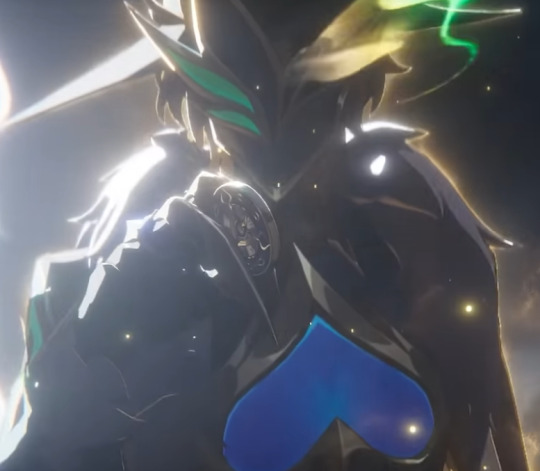
The facial features are completely obscured and asymmetrical, there's no mouth, his fingers have become claws--despite his body staying mostly human-shaped, it's obviously intended to hint at something monstrous, subsuming his original identity behind a violent facade.

Kakavasha disappears entirely behind "Aventurine" when he transforms, becoming a faceless enemy at the risk of (perhaps in hopes of) entirely losing himself. Maybe every transformation lets Aventurine throw himself closer and closer to the edge of death--and perhaps, before Penacony, only death could ever have filled the "void."
But, on the complete opposite hand (because Aventurine is always both sides of the coin), we could also argue the other end of the spectrum entirely:
A combat-oriented transformation is a show of force.
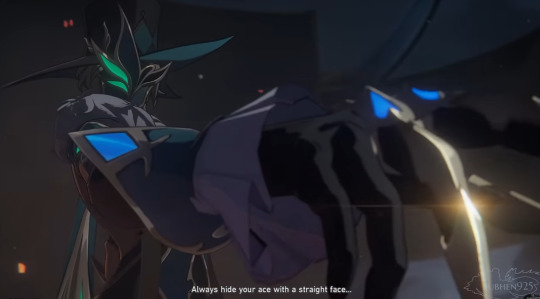
This screencap brought to you by Mr. Rubhen925 of Youtube.
Aventurine's entire life has been marred by disenfranchisement, by violations of his basic human rights, freedoms, and agency. At every turn, he has been victimized by others more powerful than himself: his childhood consisted of his clan being relentlessly hounded and hunted to extinction by the Katicans, having their food constantly stolen, their meager belongings burned to the ground, and each one of his family members systematically slaughtered, often in front of his eyes.
After his childhood, he was bought and sold as chattel for pennies, branded like an animal, and forced into a fight where to he had to beat other innocent people to death just to keep himself alive, all for the entertainment of the masses. Even Jade, who promised to help him achieve his goals, treats him like a business investment more than a friend.

In Penacony, we watch everyone he talks to degrade and ostracize him. Even though Aventurine led him into doing it, Sunday tortures and re-traumatizes him live for our entertainment.
Even more that, we see Aventurine constantly struggling with the question of whether his life is really his own or whether his blessing from Gaiathra means that his entire existence has been predetermined, his fate sealed in blood and sand from the very moment of his birth, utterly inescapable.
No matter how Aventurine tries to portray himself as the ultimate winner, he's only ever the "final" victor--being the only one left standing at the end is meaningless if on the road to getting there, you were treated like fate's favorite punching bag. Winning in the end is utterly pointless if on the road to winning, you still lost it all first, from the things you loved to your personal freedom.
What does a person who has been made powerless again and again truly desire? What void do you seek to fill if life has denied you your agency over and over?
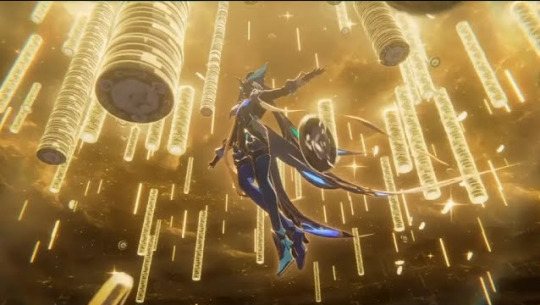
Power. Dominance. The ability to literally strike back at those who've wronged you. The strength to intimidate and force people into a corner the way you've been intimidated and forced before.
If we say that Aventurine's "void" is not a literal desire for the release of death, then it might make sense for the "void" to instead to be a frantic desire to gain control over his circumstances. To be the one finally in charge of deciding his own fate.
Particularly in light of his character story which tells us that Kakavasha's original goal for joining the Stonehearts was to save his people, the desire to take on an impressive form that screams "I'm powerful" and has the ability to physically enact vengeance on others feels directly aligned. And it remains aligned even after the reveal that the Avgins are all gone--once more fate strips Kakavasha of his power to make a difference in the world, to achieve what he truly dreams of.
The Apocalyptic Shadow version of his boss fight is called "Desperate Diceroller."
How angry he must be, deep down. How hateful the world must seem. How sad it is to feel that way.

If destiny won't let you out of the cage, your only choice is to grow claws to tear it open.
Okay, but WHY so much swag though?

Are the peacock feathers and spandex really necessary?
Listen. Everyone talks about Ratio having "gifted kid" syndrome, but I'm here to tell you that Aventurine is actually a burnt out gifted kid extraordinaire.
He's literally, canonically, explicitly the chosen one of his people.
From the moment of his birth, his mother and sister--and presumably others in his clan even--were telling him that he was their clan's most precious treasure and that he would lead them to prosperity and safety.

He carried this weight even after fleeing from the massacre, all through his childhood and teenage years, through slavery and abuse, putting his very life on the line to join the IPC in hopes of finally fulfilling the destiny his mother and sister promised he could.
He was supposed to save them. That was his meaning. That was his purpose in life.
But he was too late.
The fate he was born for, raised believing, and risked everything to achieve... is still incomplete.
So, for all that talk about suicide and power-seeking, my real answer is this: Aventurine's "void" is his unfulfilled destiny.
His whole existence has been predetermined, his life's journey laid out in prophecy and blessings from the very beginning. Yet what he thought was his fate betrayed him, and where you head after becoming an unsuccessful chosen one is a question without answer.
His thoughts constantly circle around how he is a "failure" and a "loser."

When you have no sense of purpose, when your life has no meaning, when what you are still seeking is the role you were supposed to have from the moment of your birth: the glorious destiny of being a savior, being the "happiness" of your people, being the hero...
Of course you crave the spectacle. Of course you long for the spotlight--you long to be recognized. Because Kakavasha's the chosen one. "Spotlit center stage" is where he's supposed to be--in the leading role that was stolen from him.
I think that Aventurine's cornerstone transformation is so flashy because, at the core, it represents a longing to truly be the "precious wealth" of the Avgin that his sister promised him he would be. It represents his desire to transform from a useless, "discarded" person into a larger-than-life version of himself. (Hey, fun fact, out of every official depiction of Aventurine, his boss model wears the only outfit in which his slave brand is not naturally visible.) He literally transforms into a supernatural being, capable of seizing others' fates in his hands. It represents the power he needed to save his people and himself. Its extreme flashiness screams for attention, demands to be witnessed as something beyond a helpless human.
It's almost as if Aventurine is a child writing a wish-fulfillment story where he transforms into a hyper-glamorous, all-powerful masked superhero who is capable of saving the day and winning against his enemies every time.
Unlike Jade and Topaz, Aventurine can't hide his deepest desire. It was always going to be a "transformation," because Aventurine's unanswered wish is to be someone better than himself.
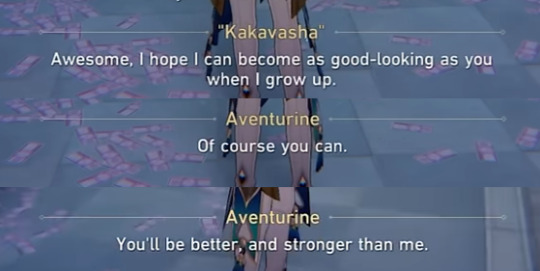
His "void," his deepest unachieved ambition--it's written right there, all over his body.
Aventurine's cornerstone power is a story he's telling himself about the person he was supposed to be.
But as Acheron claims, that's life itself.
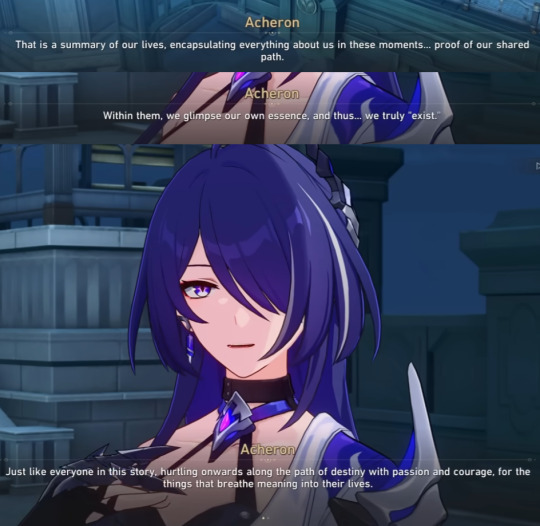
Aventurine doesn't feel like he has any control over his journey's ultimate destination.

He doesn't know where's he's headed or what the purpose of it all is. But...
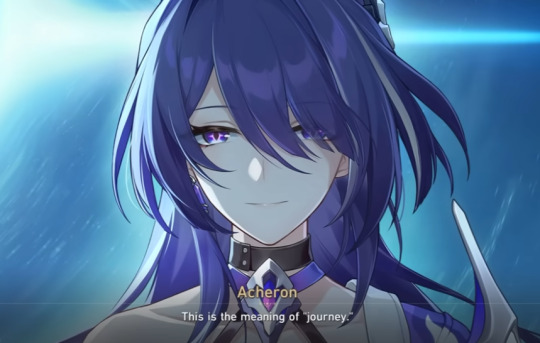
Jade explicitly describes the Ten Stonehearts and Diamond's endeavor as a "journey" as well:

Because Preservation represents the continuance of life itself, and the Stonehearts with their endless "voids"--Aventurine with his soul-deep longing to become someone better than himself--represent all of us very real human beings, trying our best to find our own "cornerstones," to gain the means to finally, finally achieve our own sweet dreams.
#honkai star rail#aventurine#ten stonehearts#character analysis#honkai star rail meta#I'm too sleepy to leave real tags#so just know that I spent the whole time writing this#laughing about how Aventurine's claws are on the most inconvenient fingers#like dude is not getting any tail in his monster form with THOSE hands#also I spent the second half of this going#“Aventurine's unfulfilled destiny is his void”#“so he can probably fix it by reviving the Avgins”#this is why everyone wants to give this man a baby#Diamond said “I don't got any babies but I do have this cool rock”#Aventurine said “Will the cool rock make me sexy?”#and didn't even wait for the answer
331 notes
·
View notes
Text
no, Jayce Talis didn't mean "Viktor, your terminal illness and physical disability that causes you constant pain are fxcking awesome actually, you should totally enjoy them" he meant "Viktor, your terminal illness and psysical disability don't make you any less loveable and I never saw you as weak or pitiful because of them. in my eyes, you were always perfect."
I have a feeling this take stems from a fundamental misunderstanding of what internalized ableism (or bigotry in general) actually is.
as a personal example, I don't exactly agree with the autism as a superpower narrative, and I refuse to be ashamed of not being proud of every single aspect of my neurodivergence and mental illnesses. no, I don't want a cure, because it still defines me as a person, but if someone announced tomorrow that they can fix my autistic inertia, executive dysfunction or sensory problems with just a flip of a switch, I'd accept that in a heartbeat. not wanting to suffer is not the same as thinking I am worthless or lazy because of my neurodivergence.
as another example of internalized bigotry: I've seen a user on the bird app having to defend herself against people who insisted that thinking periods are gross and unpleasant to have is her hating her womanhood. but listen, I fxcking hate having a uterus. I hate that I can get pregnant (I have tokophobia), and I hate periods with a fiery passion (and mine aren't even that painful, I rarely have cramps and they always last around 5 days). I don't like how they feel, I don't like the pain, the mood swings, and yes, I find blood coming out of my vagina gross, especially when it includes those little chunks. it's just a very uncomfortable experience overall. this however doesn't mean that I think I should be treated as impure, or inferior. I don't think it's okay to treat me as if I'm an inherently irrational creature (although I'd argue that all humans are, but I digress) incapable of a single logical thought because of my cycle, and I don't feel ashamed of asking for a pad or a tampon, because it's a natural bodily function and no one should ever be shunned for it.
bigotry is a social construct, it's shame, discrimination, ostracization. it's the belief that certain ways of being are inherently shameful and should be purged from "civilized" society, because to the "correct" people, they aren't even human.
Viktor not wanting to die or be in pain isn't the problem, and Jayce has already demonstrated that the only thing he hates about those conditions is that he doesn't want to lose his partner and he doesn't want him to suffer. the problem is that Viktor believed his illness and disability made him inferior and unloveable. he wanted to fix himself not just because he didn't want to die or suffer, but because he was convinced he needed to achieve perfection in order to be loved and accepted, to be a worthy partner of Jayce.
but this kind of thinking is what leads to erasing everything that makes us human, that makes us unique. that was Viktor's greatest error, wanting so badly to transcend the human condition, he risked erasing human lives all together.
#arcane#arcane season 2#JayVik#arcane viktor#arcane jayce#jayce talis#arcane spoilers#ableism#disability#terminal illness#fractal-thoughts.md
165 notes
·
View notes
Text
The Final Double Exposure Post
Okay, the game is out now and just wanted to share some final thoughts about Double Exposure and the big problems with it. All spoilers below the cut.
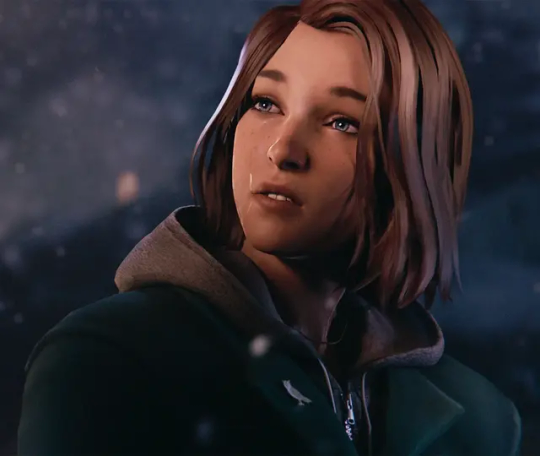
Ultimately, even outside of the brutal murder of Pricefield, gaming's most classic wlw couple, the game is just very poorly written. This post will acknowledge that breaking up Pricefield is terrible writing and they do not do it in a way that makes any remote sense whatsoever. While everyone can sit and say "It makes sense they broke up," it didn't. These characters are characters, ones designed to tell a story. Characters who exist as a bright spot for sapphic and queer people playing video games in 2015.
It's the same thinking as everyone used to say "Well if Nathan just had therapy, he'd be better." And to which it would be answered, "No shit, maybe he would have been better with therapy, but it's a story and he rejected going so no he didn't get better and won't get better because that's not the point of the story." Point being, you can self-justify the Pricefield break up with real world logic all you want, but the fact that even Dontnod is sad about the state of it should be telling. That in addition to the leaks about Square hating Chloe and the D9 narrative team hating her, and it was not done as a good faith way to tell a story. Ultimately, the game encourages you to choose the "Kill Chloe" ending of the original game so that Max can retain her memories of her in a pure way, while also removing her from story. If you choose what the D9 devs believe is the morally evil choice, you get horrible Chloe.
There is SOME good stuff in here, but it's not enough to justify the game's existence. Here are the short amount of pros we compiled for the game: the music is well done, the environments are very nice, and the side characters are fine for the most part.
That's it. Everything else is a con: the story, the handling of Max and Safi as characters, the entire mystery of the game basically being shafted in favor of... making the most important thing about Life is Strange the superpowers. It just seems like this game misunderstands what Life is Strange is or was at any point.
Max is so horribly out of character in this game. Why? Why does she do the things she does? Sometimes she feels like a natural adult version of the original game's Max, while other times she's overly horny to the Nth degree. Max has the ability to cheat on her two love interests, and both love interests reject her in the appropriate timelines of pursuance. Within the text of the game, she uses her powers to circumvent the fact that they've rejected her.
Remember the original game's ending? Nightmare!Max accuses Max of selfishly using her powers to manipulate others to her own selfish end. Ultimately, we're left with the fact that Max used her powers to help get others to like her because she didn't have many friends and was a target of bullying. It's morally dubious, but she wasn't doing any of it for like selfish personal gain. It was an extension of her anxiety.
This game goes around this and makes Max purposefully use her powers for selfish gain. The entire first game revolved around the concept of whether or not she was using it for selfish gain. She wasn't. Now the game forces Max to go through the same exact arc, but this time she is actively being awful instead. Not only cheating, but using it to get around being actively romantically rejected.
Then there's how the game handles its story. Like what the hell is going on here? How does any of it make sense. Spoilers again, but the mastermind is Safi, and Safi is a shapeshifter. She wants to take over with world with Max and collect her own superhumans to form a what? A Legion of Doom? Why? Why is Safi a villain? Her villain arc literally comes out of nowhere and the game does little to sell how she goes from wanting a book deal in the beginning to "I have godlike powers, let's take over the world together." Like honey, WHAT? WHY? And the fact the final choice is to join or refuse her??? LIKE WHAT? WHERE DOES IT COME FROM? WHY WOULD MAX, WHO EITHER HAD TO MAKE THE CHOICE TO SACRIFICE A TOWN OR HER LOVED ONE AND IS ETERNALLY TORMENTED OVER BOTH... SUDDENLY ONBOARD WITH BECOMING JUST A GENERIC EVIL GIRL?
And that's it??? Nothing else in the game matters. The romances go nowhere, thus making breaking up with Chloe pointless since it's not like the game allows Max to pursue a relationship seriously any further. Or just the mere fact she's shitty for doing so. None of the plot points of this game matter, and the mystery the game is built on doesn't matter.
It's like... Here's a murder mystery! Without the murder or the mystery! And then... the game just ends. It just ceases to exist and stops without any sort of... ending that feels satisfying. We get an AVENGERS LEVEL END SCREEN OF "MAX CAULFIELD WILL RETURN."
We think about the endings to the other game's endings. They all have some sort of conclusion that feels like its own self contained experience. You get this long and depressing ending of Chloe dying and her funeral... You get this wistful drive out of Arcadia Bay as Obstacles plays. You get Sean surrendering himself to the police so Daniel can live to grow old and not suffer for the sins of those older than him, and how Sean comes out after. You get to see how Chloe and Rachel grow as time passes to the first game. You get to see how Alex chooses to live her life on her own terms after so long of feeling like she was trapped. You get all of these different endings for the game and here you get... what amounts to the exact same ending depending on your choice which is to be horribly evil supervillain when the time comes or not, and then sequel bait with Diamond and Safi. Why? Why does she have a bleed from her nose? Since when did that become a common occurrence for superpowers? Or storms when powers are overused along with nightmares?
In the original game, the nosebleeds are a result of Max twists reality around her as the epicenter. It's the physical damage she gets for what her powers are physically doing to existence. The storm? The point is, we don't know why the storm comes.
When did Life is Strange become about superpowers and taking over the world? When did it become all of these things? Like True Colors isn't a perfect game by any means, but for fuck's sake it at least knew the scale of what a Life is Strange game should be. Small town mysteries with a colorful cast we love and hate. To this day, I still think that the Jed stuff is some of the most morally fascinating questions to be raised in the franchise. To have that final choice be to either forgive him or not? It's an incredible final choice that is so intertwined with the game's themes. To leave or to stay afterwards? They're both extremely meaningful, dual choices.
This game does nothing. That's ultimately it. What did we gain from Double Exposure? Nothing. It doesn't continue Max's character in any meaningful way. It does little to build upon the actual lore of the original game. It doesn't actually use any original characters except Chloe and that's solely to drive it in how much they despise her from a writing perspective.
Regardless of how well each game did at telling their stories... They all had something meaningful to say in some way. Even if Before the Storm is not a game that I'd necessarily say is amazing, there is some thought and thematic purpose put to that game. It's still 1000 times the game this will ever be.
When I was first exposed to the game's ending... the emotion I felt was pure and raw bafflement. Not anger. Not sadness. Bafflement and bewilderment. I had no idea what the fuck I just played or what I gained from it? What does Max as a character gain from this story? What do any of the characters in this game gain from the story? Nothing. The game starts and then it ends. And we all gained absolutely nothing from the experience. (And in BtS the ending is fine, because it's a prequel that has to have a clearly defined ending to lead into the first game. You can't break Chloe and Rachel's relationship, it always has to be what it is.)
For a long time I really hated the Life is Strange comics. It felt like a kick in the head to the original game's story. But then after it ended and this came out, we can view it as a more honest and genuine follow up to the games as opposed to... whatever we got here.
The comics focus heavily on Max's perceived guilt over what happened to Arcadia Bay. She comes to believe that she, herself, is the problem in reality. That she makes everyone around her unhappy, including Chloe. While Chloe reassures her this is not true... she ends up displaced and removed from reality... and punishes herself by sending her to a world where Chloe is happy with Rachel.
The rest of the story is Max and Chloe apart for years, as Max wrestles with her guilt... while Chloe waits for her. Chloe waits and knows Max is out there still. Max eventually realizes how wrong she was after self-reflection and being around the alt!Chloe and Rachel helps her realize she was wrong.
Chloe builds them a home.
Chloe comes to move past her own grief, just as Max did.
Chloe helps rebuild Arcadia with her own hands. She decides she has a home. This town, with Max. And then they're together... And that's what matters because... like Michel said: "They have each other."
And that is what Life is Strange was about. These two young women, who were best friends... they grew apart through tragedy and life circumstances... And then they found each other again, fell in love, and even in tragedy had one another to rely on.
I am who I am because of Life is Strange.
I met the love of my life because of Life is Strange.
And no matter how bad Double Exposure is... It can't take away Life is Strange, Max, or Chloe from me.
No.
It can't take them away from us. From all of us who cared enough to stick around this funny little 20$ adventure game from a decade ago.
#life is strange#double exposure#max caulfield#chloe price#pricefield#spoilers#spoilers for all lis games#true colors#life is strange 2#before the storm#read the comics
146 notes
·
View notes
Text
how much the audience of hotd hates alicent hightower will never not be surprising for me.
she IS the complex character you all wish for. she loves her children deeply (she literally puts her life in danger repeatedly because of them, what about sacrifice?), but she hates everything they are: targaryen, royalty, results of her parenting mistakes, proof that she was never enough even though she did everything expected (what about duty?) of her, viseris' unwanted children (but ones he FORCED her to bear), the only thing left of marital rape.
she loves rhaenyra since they are childhood sweethearts, and both mothers, and both women in the world that will always be cruel towards them (everywhere in the world they hurt little girls), but she can't help but hate her: she is everything she could never have - a beloved daughter (you were always his favourite, but otto did nothing but use her), a woman who has right to pick her own partners, who has loving and lovable children, who are not looking so targaryen-ish (having nothing of her, and everything of their father, who neglected them nevertheless), a power to be who she wants and to protect herself (dragon). and rhaenyra does everything she wants and nothing she has to do, alicent rules and sits in the council and takes care of a dying husband and STILL it's not enough and taken for granted.
she hates and loves her father. she hates and loves criston. she hates and loves her grandchildren.
she is poisonous and she is poisoned. she is a saint, she is a martyr, and she is a villain and abuser and destroyer. she is queen and she has everything to do with how her children turned out to be, she is their root, she is their core. and at the same time she has no control of anything that has happened to her - she did not pick her father, her friendship or its end with rhaenyra, her marriage, her children. there's no way all of this could've turned out to be happy. she is sansa that never was saved from joffrey (broken, hopeless, betrayed by her own family). she is cersei if jaime died during roberts rebellion (powerless, lonely, forced to have children that are never truly yours). she is lyanna that stays alive after giving birth to jon (realising there's no such thing as love, that your only goal in the world is to bear children, and if they do not fulfill some stupid prophecy - they are not wanted by their own fathers). she is elia who lives (a mother of abandoned children, a living woman, but your husband prefers a ghost). she is daenerys that never got her dragon (just a shadow of a husband that died and you feel equally relieved and terrified by it). she is any woman in this world that isnt empowered by some magic, or superpower, or prophecy, or even men. she is as powerless as power hungry, as broken as whole, as doomed by the narrative as she could be.
and what you call her is "bitch", or "terrible mother", or "whore", or " stupid".
#alicent hightower#hotd#hotd season 2#hotd sexism#team green#house of the dragon#hotd meta#queen alicent#hotd alicent
203 notes
·
View notes
Text
The Index
This is an index of things I've written and posted online, with minimal descriptions because most of them have blurbs if you click the link. This list is not exhaustive, especially because there are a bunch of short stories and dribbles in various places. If something you liked is missing, let me know.
Web Serials
Worth the Candle - Juniper Smith is a teenaged Dungeon Master who ends up in a world filled with all the things he dreamt up for his campaigns, along with signs of his friend who died months earlier. This Used to be About Dungeons - Five teenagers live in a house together, bake bread, tend the garden, and occasionally fight monsters in dungeons. Thresholder - Thresholders travel from world to world, fantasy one minute and scifi the next, always encountering an opponent, growing stronger as they battle. Shadows of the Limelight - Fame gives you superpowers, and Dominic just saved the world's greatest hero from defeat in full view of a large audience. Glimwarden (unfinished) - A small town huddles around lanterns that keep the darklings at bay. Four teenagers must grow in power as the darkness encroaches. The Dark Wizard of Donkerk (unedited) - Two men steal a baby from an orphanage, then find out he's too cute to sacrifice and raise him as their own.
Fanfic
The Metropolitan Man (Superman) - Lex Luthor attempts to unravel the secrets of the alien. A Common Sense Guide to Doing the Most Good (Superman) - Superman gets really into effective altruism. Instruments of Destruction (Star Wars) - A fable of project management aboard the second Death Star, through the eyes of Admiral Tian Jerjerrod. Branches on the Tree of Time (Terminator) - Sarah Connor is working as a software engineer at UCLA when a naked man shows up on her doorstep. A Bluer Shade of White (Frozen) - Elsa can make life, and Olaf is smarter than he looks.
Shorts
Eager Readers in Your Area - Artificial intelligence has left authors scrambling for readers. Charlotte clicks on an ad. Variations - An orc visits an art exhibition where she feels out of place. Contratto - Julia takes a job as a marketer, working for the vampires to keep their secrets safe. The Randi Prize - James Randi offers a prize for anyone who can demonstrate supernatural abilities. Coming Home - After a long time isekaied to a fantasy kingdom, an errant father has coffee with his estranged son.
I also post short stuff to this very tumblr, which can usually be found under the #microfiction tag unless I forget. Usually this is mirrored on AO3, unless I'm lazy.
Web Comics
Millennial Scarlet - Lamont Pearce is a gig economy demon hunter whose mother ran a government agency meant to defend against Hell. Worth the Candle - A webcomic adaptation of the web serial
Non-Fiction
The AI Art Apocalypse - Slightly outdated thoughts from 2022. Why to Write a Sex Scene - Observations on the narrative purpose of carnal pursuits. Game Review: Underhill - This review contains no screenshots, because this game does not exist. Writing: An FAQ - Accumulated wisdom from 4 million words and counting. Creating Interesting Magic - A much-requested post on making interesting magic systems (and characters, and plots, and worlds). How to Write a Web Serial - It's both easier and harder than you think. The Trouble with Writing Nazis - On giving villains too much credit. Interesting Things to do with Time Loops - Exploring the boundaries of the conceit.
115 notes
·
View notes
Text
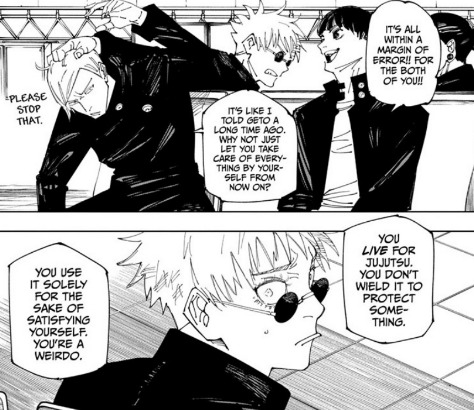
GREAT TEACHER, GOJO
For my final commentary on chapter 236, I thought I'd talk about this panel the starter of a million flame wars on twitter dot com. The big controversy is Nanami stating that Gojo fought only for himself without mentioning his students which a lot of people thought was a last minute reversal on Gojo's character, or character regression.
I'm not going to call anyone stupid, or say if you have good teacher Gojo headcanons you're wrong. However, I'd like to point out that Gojo's always been more complicated than most shonen mentors. He's not Kakashi, and he's not Aizawa, and I'd argue the fact that he's not the standard "I'd die to protect my students" mentor we see in shonen manga is what makes him interesting.
The Springtime of Youth
Jujutsu Kaisen is a shonen jump manga that is very aware of the other manga that are running in the same magazine and uses that awareness to play with audience expectations.
To put it simply if you don't want to use words like Deconstruction - if you're reading Jujutsu Kaisen then things are probably not going to go the way you expect them. It's not Naruto, it's not My Hero Academia, it's a little bit like Bleach except characters actually die.
If you expect things to go one way in Jujutsu Kaisen, then you're going to be thrown a curveball. To name some examples briefly before diving into Gojo.
Yuji Itadori is a normal boy protagonist suddenly dragged into the world of the supernatural.
However, everything goes wrong from there. Jujutsu Sorcerers are not heroes. Yuji is told that much from the beginning by Megumi within the first thirteen chapters. The world of Jujutsu Sorcery is not a good place to be, Yuji is initially excited to be a sorcerer and to be a part of this world and then learns that lesson fast. I mean, imagine if Deku was accepted to UA, and then he immediately learned that students at the school die on the regular and all the adults are either terrible selfish people, or if they're not they die too like Nanami because being selfless means sticking your neck out for someone else.
Yuji's not really special in the narrative. He's just a kid who swallowed a finger. He doesn't have a secret technique. We're hundreds of chapters in and he's still just punching people. If he's cornered in a fight he doesn't unlock a secret technique either, he just loses.
Yuji has a superpowered evil side, like the nine tailed fox, or Hollow Ichigo except it's not really his super powered evil side. It's an evil parasite attached to his soul with a will of its ownt hat will manipualte him. Hollow Ichigo and the Kyuubi can escape temporarily and there's usually no consequence. Sukuna escapes twice, the first time he nearly kills Megumi, the second time he kills thousands.
Yuji is kind of like a main character who is not a main character.
If you still believe he's the main character, then you can agree he's punished for thinking he's the main character and therefore things are going to be easy, because nothing is ever easy in Jujutsu Kaisen.
Megumi is a riff on the chosen one. He's supposed to be the Gojo Satoru of his generation, born with the strongest technique that ca even surpass the limitless and he's nowhere near the level he's supposed to be. This is because Megumi has been continually failed by every adult figure all his life, starting with his father who sold him, then Gojo the man who SAVED* him techically but with a big asterisk that he needed to become his student and do jobs for Jujutsu High School otherwise Gojo would just let the Zen'in take him or let them starve I guess. Megumi has no adult figures to rely on, and has been given very little freedom about who or what he wants to be in his life, and therefore he's a very passive, repressed individual who's riddled with insecurities. Megumi doesn't want to be the strongest like Gojo, or like many hero / rival characters in shonen manga. Megumi doesn't even know what he wants to be, because he's never been given any choice in life.
If you don't think Megumi's a deconstruction of any sort of character type, look at those posts on twitter that are like "Look at the black haired depressed shonen boys" and then look at Megumi, he's never actually like any of these boys because he's much deeper and probably closer to being the main character than Yuji is.
Then we get to Gojo who is very unlike all the other mentors in shonen manga.
If Yuji and Megumi are both riffs on a main character, a hero in a world so cynical he's not allowed to play hero and actively punished for it, and a chosen one who doesn't want to be the chosen one then you have Gojo as the mentor who's nothing like the classic mentor.
The problem with mentor characters in fiction is that number one they die a lot (spoiler warning Obi Wan Kenobi dies in Star Wars just so you know) and number two they're not usually the most complex character in the cast.
What is the mentor there for?
To Mentor (duh.)
What this means is they are usually a fully formed adult who can teach a lesson to the main character, who in shonen manga is typically a teenager.
I say they're usually less interesting because stories are about characters changing, or characters learning lessons. A teacher presumably already has learned his lesson. They are usually at the end of their journey and not the beginning, that's why they can offer wisdom to the main characters. They're not usually their own separate characters because of this - a narrative doesn't have time to waste on a character that's not going to change.
Jung had a term for this character, it's called the Wise Old Man.
In Jungian analytical psychology, senex is the specific term used in association with this archetype. Examples of the senex archetype in a positive form include the wise old man or wizard. In the individuation process, the archetype of the Wise old man was late to emerge, and seen as an indication of the Self. 'If an individual has wrestled seriously enough and long enough with the anima (or animus) problem...the unconscious again changes its dominant character and appears in a new symbolic form...as a masculine initiator and guardian, a wise old man, a spirit of nature, and so forth'.
The role of the wise man archetype is to help other people along with their ego development, because usually they are already fully developed individuals.
Obi Wan is the most typical of typical mentors, and he dies in Star Wars because after he finishes teaching Luke he has nothing to do. This is Luke's Hero's Journey. Obi Wan's already happened offscreen, he's at the end of his journey there's no room for change or growth in him because his story purpose is to exist to advise Luke and to do that he needs to be a fully grown adult figure.
The subversion to this when the mentor has their own agenda (Gandalf), or the mentor is as flawed as the main characters themselves and so therefore he has something to learn.
Gojo is kind of a combination of both, like Gandalf he is the mysterious but seemingly all powerful wizard (er... or rather sorcerer) with his own agenda, and he's also practically the fourth member of the main cast who are otherwise all teenagers. In fact, Gojo spells out his agenda in the same panels that everyone uses to constantly assert that Gojo is a good teacher who only wants to protect his students.
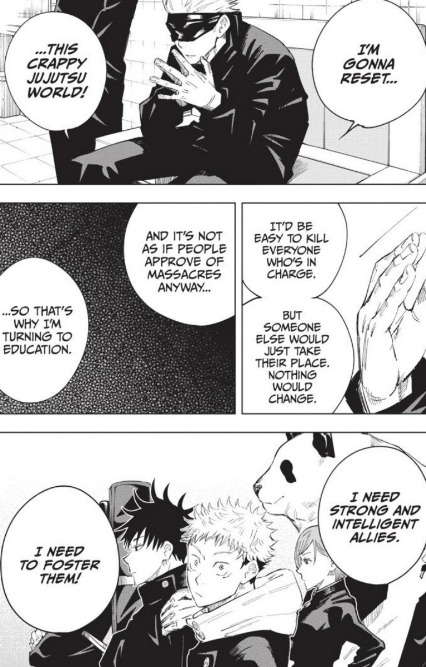
He wants to make the Jujutsu World a better place (good) which is why he is raising students so he can turn them into his political allies to make a regime change (hidden agenda).
It's a means justifies the end type scenario. In Gojo's mind the means (raising kids as tools in support of his political agenda) justifies the ends (a better jujutsu world for those children). His motivation is still the same. This is what I think people most often get confused about with Gojo's character. I think he is one hundred percent genuine about wanting a better world.

"I have a dream, I want to reset this crappy Jujutsu World" is his motivation, but not his means. He uses his students as a means to achieve that end. Even if it's purportedly for their sake, he's still using them. I don't even think this is subtext it's text, both Megumi and Yuji call themselves cogs.
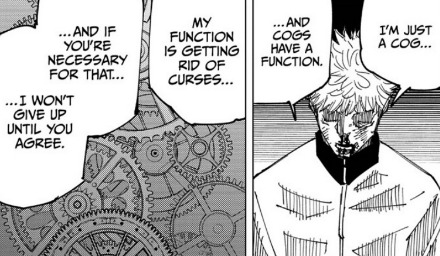
"But senpai, what's your function...?"
You could say in this case that the ends don't justify the means. Is Gojo really protecting these kid's youth, if Yuji and Megumi are going around calling themselves cog and acting like they don't matter in the grand scheme of things? In fact the narrative is inviting you to question if Gojo's ends justify his means.
Gojo's ideals can be one hundred percent real, but he can also pick faulty ways of choosing those ideals that fail to live up to them. In fact most people fall short of ideals, that's why they're called ideals. Gojo is taking these kids in because they have strong potential as sorcerers and he wants to recruit them, that's his hidden agenda. It's confirmed in databooks in Yuji and Yuta's case, and even if you don't trust databooks as canon then look at how he treats Megumi.
Megumi is explicitly Gojo's student, not his son. He only intervened in Megumi's situation on the caveat that Megumi work for him. Presumably, if Megumi didn't want to be a sorcerer and just wanted to be a normal kid, Gojo would have either let the Zen'in have him or do nothing. The option of just calling child services and getting someone to foster Megumi until he was older didn't even seem to cross Gojo's mind. There's the help he gives (Food money, rent, protection from the Zen'in) and then the hidden agenda (Don't work for the Zen'in who are my political rivals, you're my student now).
Yet at the same time Gojo is shown going to find Megumi after Geto's defection, probably because of the words he said to Yaga "You can only save those who want to be saved," when he realized it was too late for Geto. Was he intervening earlier for Megumi because he learned from being too late with Geto? Did he think Megumi needed guidance, or did he think Megumi needed protection in his youth so the Jujutsu World wouldn't corrupt him like it did Geto, or did he think he just needed to make it so Megumi was strong so he wouldn't fall behind him because Geto fell so far behind him once Gojo became the strongest. There's ambiguity there, because the hidden agenda is you know... Hidden. That's what I mean with Gojo though, you can look at him from multiple angles, he's not just (I love my students I'd die for them) because that character would only have one purpose in the narrative and that'd be being the perfect mentor who teaches them all the right lessons.
Gojo's not like other mentors, and in fact he's a commentary on the mentors that everyone is always comparing him to and expecting him to be like.
Literally everyone who reads Naruto has the exact same response, "I hate how the manga never talks about how it's a bad thing to send these child soldiers into war, and nobody breaks the cycle."
There are a lot of people unhappy about the same thing in My Hero Academia, "Why does nobody talk about how wrong it is that the adults make these high school students fight on the battlefield."
Well there you go. That's Gojo. His dream is to make it so Jujutsu Society is a place where teenagers can survive until adulthood. His method of doing so is to... raise those teenagers to be stronger than the previous generation, but you know still letting them be child soldiers on the battlefield just stronger ones. He does this because if he's working within the system the his two choices are raise a group of people who can age out and replace the old regime, or just kill everyone at the top.
Everyone complains about how no one talks about the child soldiers in Naruto or My Hero Academia, but here you go, we have a manga that is centered around how messed up it is to send high school students to continually fight these curses before they even turn eighteen. Gojo's sending these kids out there still even if he wants to change things, and it's supposed to be a little messed up and also a contradiction to what his ideals are supposed to be.
Because in My Hero Academia you have characters like Aizawa and Kakashi who are "I will die for my students" but then they just send those teens out to fight in a war, and seem totally fine with that. It's a hole in the writing, but this time it's done on purpose, to ask why these adults are always comfortable sending teenagers out to fight for them?
Jujutsu Kaisen provides two answers, number one the system is inherently corrupt and it sees the youth as cogs because the system is rooted in traditions that keep the elderly in power. Number two, in Gojo's case at least this is exactly what it was like for him growing up as a child. Gojo is just repeating with his students what was done to him, subconsciously.
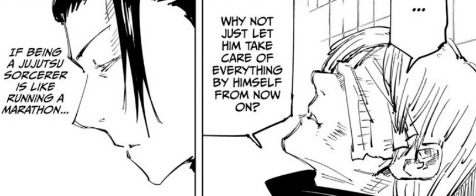
The reason Nanami said this, and then repeated it in this most recent chapter is Gojo was born to be a Jujutsu Sorcerer. Being a Jujutsu Sorcerer is a highly deadly occupation for everyone else, except for Gojo. Not only that but because he's so good at it, and he's so lauded for it he's built his entire identity around it. Nanami's not just saying that Gojo is selfish, he's also saying that Gojo thinks being a sorcerer is a good thing. It is the end all, be all of Gojo's existence.
He doesn't want to make it so sorcerers don't have to fight, or make it so all cursed energy is gone for the world like Yuki Tsukumo, his dream is actually kind of limited in scope he doesn't want the school days of his students to be destroyed by the outside world the way it was for him and Geto.
Gojo looks at the symptoms and not the cause. Geto defected, Haibara died, Yaga wasn't really able to do much for his students in both scenarios. Gojo deduced it was because the elders and regressive policies were holding people back in favor of keeping the regime in charge (correct) and that because of that the sorcerers in Gojo's high school years just weren't strong enough to keep up (this is just what Gojo thinks).
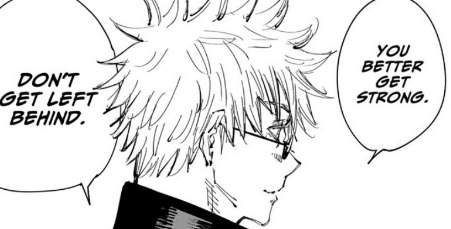
His words to Megumi are encouraging him to be strong so he won't get left behind, which as I speculated above might imply Gojo thinks that part of what went wrong with Geto was that he simply wasn't strong enough to keep up with Gojo or stay on his level. If not then he still encourages Megumi to get strong before everything else, he's not taking care of these kids emotional needs, he's pushing them to get stronger because in Gojo's mind that's the be all end all solution to every problem.
"Nanami's line was not saying that Gojo doesn't care about children, it's saying that "You live for Jujutsu." It is the lens through which Gojo sees everything, and so therefore he doesn't think of breaking kids out of the Jujutsu World, just making it a place that's slightly more safe for them. Gojo's ego is so strong that he only ever sees things from his point of view, being a sorcerer was fun for him, his high school days were the happiest time in his life before they got ruined by outside forces.
He's trying to protect those days for his children, but he's not arguing against the existence of an institution like Jujutsu High in the first place. He's not saying the teenagers should never be sent out on missions, he's saying we need to make the teens stronger. If they're stronger than they won't die (that's probably true but they'll be even safer if they don't have to go on missions in the first place).
Now we have a reason! Why do Aizawa and Kakashi send out child soldiers into the battlefield if their goal is to protect their students? Because it's a shonen manga and the main characters are all teenagers.
Why does Gojo send out teenagers to fight for him if he wants to protect them, well I just explained it.
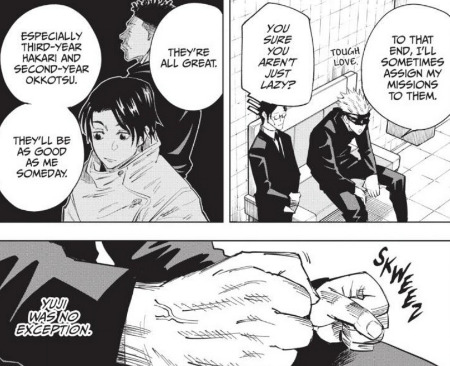
In fact, the entire purpose of Nanami in the story is to give us a character who explicitly treats children like they are children and not miniature adults. Who acknowledges that this is emotionally hard for children to deal with and they shouldn't have to do that.


Nanami's lines of "I'm an adult you're a child" and "Being a child is not a bad thing." would not have the weight they carry if they weren't so different from the way that every other adult in the story (including Gojo) treats children.
Nanami and Gojo have the same goal of making being a Jujutsu Sorcerer easier for children, but Nanami practices what he preaches. He tells Yuji to stand back and that he doesn't need to fight if he sees an enemy that's too strong, to let the adult on scene handle things first.
When he sees that Yuji is disturbed by the idea of killing former humans that Mahito had changed with his technique, he consoles him. He knows that Yuji is a sensitive kid and tries to spare him as much of that grief as possible. When he leaves Yuji behind he tells him explicitly that he's the adult in this situation, he shouldn't be forcing a child to help carry that burden if it's not necessary.
He also explicitly tells Yuji that being strong or jumping into life threatening situations =/= as growing up. Nanami is a character aware that the problem isn't that the children are not strong enough, but that too much responsibility is being thrown on these children. That there is a difference between what children and adults are emotionally capable of. Gojo doesn't see that difference because he reached enlightenment as seventeen. He even explicitly chose Nanami because Gojo knew he wasn't good at that stuff.
Nanami was not saying that Gojo doesn't care about children, Nanami was saying Gojo lives to be a sorcerer, Gojo who loves sorcery doesn't understand why being a sorcerer is too much of an emotional burden on a child. He just doesn't. He literally says his students are flowers.
Now, here's the kicker. Nanami dies.
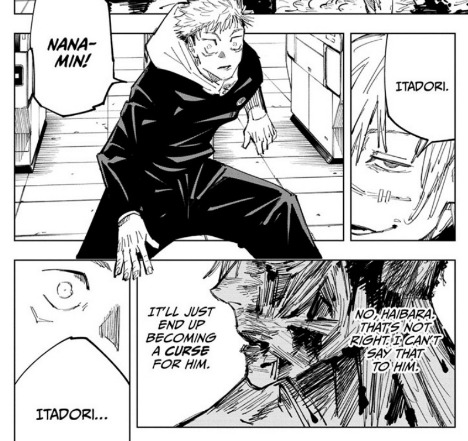

Nanami wanted Yuji to not take on too much responsibility, and he died leaving Yuji with more responsibility than he could ever carry. Nanami failed in his goal, despite the fact he is the most responsible and well-meaning adult in the story who treats children like they're children.
The reason he dies is because this is what happens to people like Nanami in Jujutsu Society. The whole of society is built to condition people into being cogs and Nanami who's just one person can't overcome it on his own. I can write a whole meta on how Nanami's way of dealing with children is way better than Gojo's and yet they do essentially the same thing, throw way too much responsibility onto Yuji even though he's just a kid. They're both too ingrained in the system to make any sweeping changes, and that's why the child soldiers keep on child soldiering.
Gojo as a Character
The second reason as eluded above that Gojo is not meant to be read as a perfect teacher, or even a good one really is because he's the fourth main character of the cast. If you are a main character, then you need a flaw, and an arc where you either improve upon that flaw or you succumb to it in tragic fashion.
Gojo's not the perfect adult mentor, because he's kind of in the same place as the kids themselves. I think there's a reason we never learn anything about Gojo's backstory, we know nothing about his parents, the Gojo clan, because those details aren't as relevant. The most important thing about Gojo is the three years he spent at high school, because that was the only time he felt like a person, and also because he is trapped there mentally.
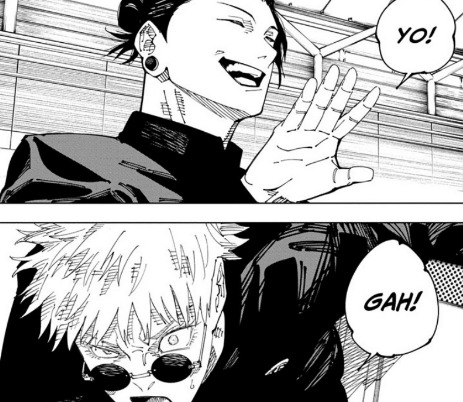
There's a reason that Gojo's dying dream is him imagining everyone reset to seventeen years old, because that was where the clock stopped for him in his youth, and that was where all of his regrets as an adult come from. His motivation to help teenagers today only comes from his own youth being ruined, and the adults in his life failing to protect him.
It's very likely that Gojo who lives for Jujutsu probably would never have realized the problems in his current society, if his youth wasn't ruined by those same adults he's now fighting against.
The reason most mentor figures in fiction are not main characters is because as adults they don't really need to grow up anymore. The obvious solution is that you just need your mentor character to just fail to be an adult in some glaring way.
To show how Gojo falls short as an adult, especially in regards to these children and how he treats them is to drag him down from all powerful, all knowing wizard, and make him struggle with the rest of the main cast. Gojo is not a positive adult figure in these kids lives despite having the best of intentions, because he's not really an adult.
I guess if you were already the best and strongest person in the world at seventeen, smarter and more capable than all the adults around you, you wouldn't really feel the need to grow up. Coupled with the fact that you are alienated from other people and do not relate to them on a personal level that's not going to help with your identity formation.
I mean I constantly compare Gojo to Superman, but to be fair to Gojo instead of bullying him like I usually do Clark Kent was raised by parents who raised a boy not a superman, and who constantly tell him that he's just a normal person, his powers don't make him great, it's his heart.
Nanami says that Gojo only fights for himself that ""You don't wield Jujutsu to protect something, you use it solely to for your own sake. What a weirdo" it's likely Gojo only fights for himself because he's never ben told that's he's more than just the six-eyes and more than just the limitless.
The best way to make a mentor a part of the cast, is to make them through some way or another have failed to grow up properly in their youth and therefore they need to do it while the story is taking place. We know how Gojo failed, his springtime of youth ended early, it ended the day he couldn't stop Geto from leaving, the day he can be the strongest sorcerer ever and still fail because sorcerer society is too corrupt for one person to handle alone. We also know he didn't really grow up past this point, because he still thinks the solution is to make people be stronger. Why does he not do anything about Geto for 11 years? In story terms he's basically suspended in time unable to grow past Geto. Kenjaku literally uses the trauma from his youth and the memories that seeing Geto alive would provoke in Gojo again, to trap him because he knew it would make him freeze up. Gojo is frozen in the past, he failed to grow up in story terms and must now grow up while the main story itself is taking place along with the children he's trying to raise.
This is how you make a mentor interesting. You have to make them flawed in some way that makes it worth having them onscreen, because a perfect mentor only serves one purpose to teach a main character and then he's gone.
Dazai Osamu from Bungo Stray Dogs is a character that's almost as massively popular as Gojo. Similiarly, he is a teenage genius who found trouble relating to other people who is now as an adult attempting to mentor two children.
However, Dazai's faults as a mentor are made much more explicit.
Dazai suddenly punched Akutagawa in the face, preventing him from finishing his sentence. Akutagawa flew back onto the ground, his head bouncing off the stone flooring with a thud. "Perhaps I made it look like I wanted to hear excuses. Sorry for the misudnerstanding," Dazai said while rubbing his knuckles. "Urg..." Akutagawa moaned. He'd hit his head so hard that he couldn't even stagger to his feet. "Give me your gun," Dazai ordered one of his men. The subordinate was hesitant but nonetheless handed over his weapon. Next, Dazai removed the magaine from the automatic pistol, took out all but three bullets, then put the magazine back in. He immediately pointed the gun at Akutagawa, who was still on the ground. "I have this friend who's supporting several orphans all on his own, you see," he continued his weapon still drawn and aimed at the boy. "AKutagawa I'm sure Odasaku would've been patient enough to give you the guidance you needed had he been the one who'd found you on the brink of starvation right in the slums. That would have been the 'right' thing to do. But 'righteousness' doesn't take very kindly to me. And there's only one thing people like me do to useless subordinates." Dazai mercilessly pulled the trigger the moment he finished his sentence.
(Don't worry, Akutagawa lived). Dazai is a character who had a troublesome youth he never grew up from. He was too smart for the world as a kid, and because of that joined up with the mafia because he wanted to feel like he was more connected to life and other people by getting closer to death (weird dazai logic I know) and was the best of the best at it, but it only drove him further away from people. He makes one friend, and loses that friend similiar to Gojo. Just like Gojo too, that friend is the one who gives him his purpose as an adult that drives him to mentor young people.
"Odasaku.. What should I do?" "Be on the side that saves people," Odasaku replied, "If both sides are the same, then choose to become a good person. Save the weak, protect the orphaned. You might not see a great difference between right and wrong, but... saving others is something just a bit more wonderful."
Is this not what Nanami said just in different words. Odasaku tells Dazai point blank, I know you're selfish, I know that you don't really have any concept of good or evil but you can choose to save others anyway.
Isn't this what Gojo does?
He is selfish. He doesn't really consider the morality or his actions or get hung up on the idea of protecting the weak like Nanami or Geto do, but he still does go out of his way to live for the ideal of saving children.
Both Gojo and Dazai are characters who are struggling with this ideal of saving the children, because while their ideals are good they themselves as people are morally gray. Adding onto that, they're also children and a good deal of their backstory is devoted to showing why they never really grew out of the mindset that they held as children.
The story doesn't call them horrible monsters for it, it's just saying that they need to grow up or face the consequences of not growing up.
"I have one regret," I said. "I never got to say good-bye to my friend. He was always there for me as 'just a friend.' He was bored of this world and always waited for death to come for him." "That man was in search of a place to die just like me?" "No, not exactly," I answered. "I thought you were similiar to Dazai at first, rushing into battle and wishing for death without even considering the value of your own life. But he's different. He's sharp-witted with a mind like a steel trap. And he's just a child - a sobbing child abandoned in the darkness of a world far emptier of the world we're seeing." He was too smart for his own good. THat was why he was always alone. The reason why ANgo and I were able to be by his side was that we understood the solitude that surrounded him, and we never stepped inside it no matter how close we stood. But in that moment, I kind of regretted not stepping in and invading a little.
Does that sound like the narrative is condemning Dazai for being who he is? No, it's Dazai's best friend offering empathy and understanding for how lonely it must be, and how if Dazai made real connections with people then he could have a chance of growing up like everyone else. That's what the narrative challenges Dazai to do while empathizing with why it's harder for him to and why he's still trapped in his youth, because to take care of children you need to be an adult yourself. Otherwise if you're a child, and I'm a child, then nobody's driving the plane.
Rupert Giles from Buffy the Vampire Slayer is another mentor who faces the same moral dilemna that Gojo does. In fact his entire character revolves around the fact he knows deep down he's sending a kid to her early grave.
Buffy is the Chosen One TM. One girl in all the world is chosen to fight the vampires. Much like sorcerer society, there is an entire bureaucracy dedicated to identifying the chosen slayer and then raising her up and guiding her as a weapon to be used against the threat of vampires and demons.
The watchers are all adults. The slayer is a teenage girl. The slayer slays. The watchers watch. Just like in Jujutsu Kaisen, there is a necessity for the Slayer to exist, because the alternative is just letting vampires eat people. Yet even if the slayer needs to exist, at the end of the day a bunch of adult men are sending a teenage girl to fight for them.
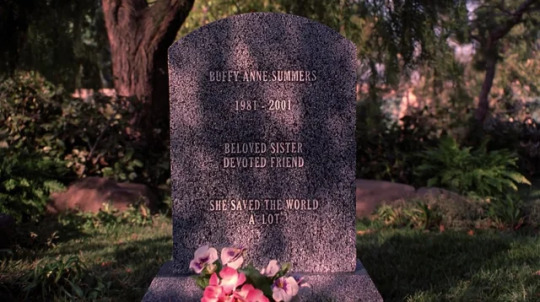
All Slayers die young. All of them without an exception. No matter how good of a mentor is, no matter how much he cares about her, Buffy is going to die one day, and Giles is going to watch. Because that's what the watcher does, they watch. Sending her on missions means Buffy's in danger, not sending her means innocent people are in danger.
It's a scenario that's pretty much like Gojo's, and the narrative of Buffy makes it explicit that Giles really can't be a father figure to bufy in this scenario. A father would have to choose to put their child above the world and keep them safe, not send them out straight into danger.
It is a choice that Giles makes over and over again. He is always her watcher and never her father. There's a season 3 episode where Giles literally drugs Buffy as a part of a test to prove she is "worthy" of being a slayer. A test that deliberately puts her in harms way that he complies with - because the system told him to. A choice to be her watcher and act according to what the council of watchers wanted and not what Buffy wanted. A choice that shatters the illusion that Buffy had of him, showing her that Giles is only there to teach her to be a Slayer, not to take her to the iceapades or buy ice cream with her.
In this scenario Gojo is very much like Giles as no matter how much he may personally like these kids, he is not their father, and there is only so much he can do for them when he's still feeding them into the same system. Giles loves Buffy, Giles wants to protect Buffy, Giles is a part of the system that exploits Buffy. Giles is an adult asking Buffy to risk her life to save the world.
Gojo goes out of his way to recruit Megumi, Yuji, and Yuta among others. Gojo still doesn't let them be anything other than sorcerers, and as sorcerers they're still guaranteed to one day die and probably die young. Gojo wants to revolutionize the system he is, but he still sends out his students to do missions as part of that system. He's not letting them escape it, he's just making them be stronger sorcerers.
Not only is Gojo not a father figure to Megumi, he is exploiting him more or less. The option of Megumi not being a sorcerer isn't on the table. No matter how well-intentioned he may be, or how good his ideals are he's still an adult telling a child to make a sacrifice for the world.
So, there are two character conflicts with two different mentors that both reflect Gojo. Gojo cannot grow up because he's still trapped in the tragedy of his youth. He himself is not an adult, for various reasons (lack of connection to other people, trauma in his youth) he's egocentric like a child but there are children in his life who need him to be.
Gojo also cannot be a proper adult, because he is part of a system that exploits children. We see what the system does to proper adults like Nanami, he shows us just how much well-intentioned adults struggle to help kids under sorcerer society so how about Gojo who thinks being a sorcerer is really fun. A proper adult would never send kids on those missions, they'd find some way to shield them but Gojo cannot do that. Because sorcerers are short staffed and innocent people will die if he doesn't. Because Gojo isn't the sorcer-king of Jujtusu Society and is working within it to affect change. There are reasons, but still Gojo is failing to live up to his desire to protect children because he's not doing what a responsible adult should do in this situation.
Gojo's failures are two-fold, and yet it's because of those failures that he was a main character who got as much special plot attention as he did. If Gojo was a perfect teacher he wouldn't be a character. After all, we relate to the struggles of other human beings we see onscreen in television and in movies so why would we care about a perfect character?
Gojo has a lot more to say about teachers in shonen manga, and also about childhood vs. adulthood as a bad teacher struggling to be a good one, then a teacher who's already perfect. Nanami said those lines because he wanted us to understand the audience that this is who Gojo is, he is a selfish and egotistical person who nonetheless was trying to do good things.
#jjk meta#gojo satoru#satoru gojo#nanami kento#kento nanami#jujutsu kaisen meta#jujtusu kaisen#jjk spoilers#jjk 236#jujutsu kaisen spoilers#dazai osamu
732 notes
·
View notes